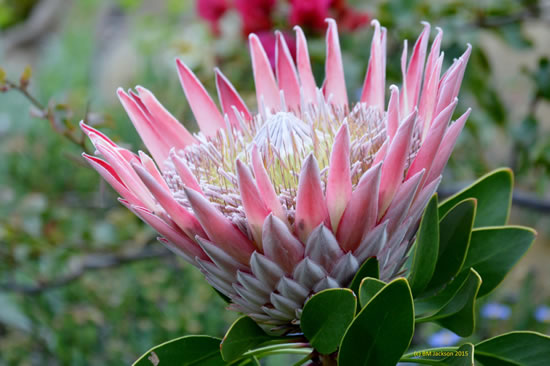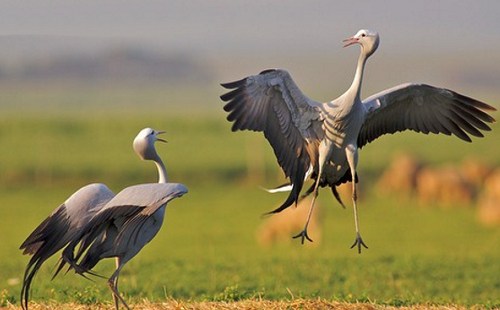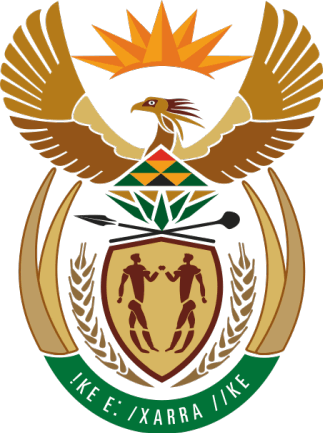Apr 2016 2nd Edition
Apr 2016 2nd Edition andile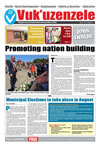
Translations
Promoting nation building
Promoting nation building andileThis year South Africa marks 22 years of freedom and as the country prepares to celebrate this milestone on 27 April, Minister of Arts and Culture Nathi Mthethwa has called on South Africans to focus on what unites us, rather than on what divides us.
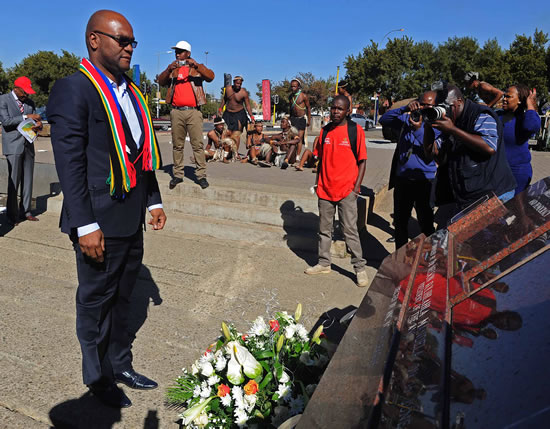 With economic growth slowing, Minister Mthethwa pointed out that government is working hard to make the country a more attractive investment destination, adding that efforts are intensifying to deracialise the economy and promote social cohesion. “Government has also appealed to everyone to favour what unites us over what divides us,” he said.
With economic growth slowing, Minister Mthethwa pointed out that government is working hard to make the country a more attractive investment destination, adding that efforts are intensifying to deracialise the economy and promote social cohesion. “Government has also appealed to everyone to favour what unites us over what divides us,” he said.
To help improve relations between different communities, the Department of Arts and Culture has also been holding social cohesion debates, dialogues and community conversations throughout the year to encourage people to come together, discuss their differences and forge ahead with a common understanding of what it means to be South African. By February, the department had held 33 community conversations on social cohesion and nation building. These covered important aspects around nation building, including national identity, social interaction, active citizenry, volunteerism and human rights. The idea for the conversations stems from the 2012 National Cohesion Summit held by the department on social cohesion and attended by various sectors of society. Those attending resolved that to deal with the divisions of the past, the government must help open avenues for dialogue.
Getting communities involved
Minister Mthethwa said the dialogues aim to unlock opportunities for social cohesion, most of which can be found within communities themselves. “The platform enables community members to identify the social, cultural and economic capital from within the community and how these could be harnessed to the benefit of all,” he pointed out.
Recently, the department decided to change its approach to the community conversations, in a bid to ensure that these become more meaningful engagements. In the new approach, which started last month, the department will get communities to focus more on finding practical solutions to the challenges that may divide some members and would look more at issues around race and racism. Importantly, the new approach stresses continuity. Once-off engagements will be replaced by ongoing community conversations.
The Minister said connecting community members with organisations and appropriate government entities for further engagements would go a long way in ensuring that after the initial dialogue, they remained engaged.
His department plans to hold talks with the same communities annually over the next three years to determine whether the conversations have helped bring about any change in their perceptions towards issues of social cohesion and nation building.
Social cohesion advocates
Minister Mthethwa also highlighted another of the department’s initiatives to enhance social cohesion – its engagement with eminent persons in society who voluntarily act as social cohesion advocates or champions in different communities.
The five-year programme is aligned to the 12 resolutions emerged from the 2012 summit and is also informed by the National Development Plan (NDP) and the goals in the government’s Medium Term Strategic Framework (MTSF). The advocates consist of independent thinkers drawn from a broad range of sectors including the judiciary, arts, sports and entertainment, religious fraternity, business, labour, and academia.
Among other things, the advocates will be the link between government and communities. However, he stressed that the advocates are in no way government trying to nose into communities. “The fact that they are expected to be a conduit between civil society and government should imply that they will have some measure of independence. In fact, while part of their role is to assist government in its various efforts to foster social cohesion and nation building, they are simultaneously expected to hold government to account in their role as mouthpieces of the broader civil society,” he said.
Heritage landscape
In April last year, as the debate surrounding the desecration of various statues in the country was building, Minister Mthethwa held a national consultative meeting with political parties and civil society organisations to look into the current heritage landscape. Those present adopted 20 resolutions and a 10-member task team was set up to examine these further. The task team has since presented a report of its findings to the Minister, which is still to be made public. However, Minister Mthethwa said the majority of respondents during the public hearings were against the vandalism and destruction of statues. “There were some examples given of erection of new statues alongside old and offensive statues like in Bethal,” he added.
Those resolutions adopted following the debate included one to continue to remove place names that are offensive or hateful and to hold talks with communities to choose new names. Minister Mthethwa said the South African Geographical Names Council and the Provincial Geographical Names Committees were constantly reviewing offensive names as part of their mandate. “They then submit them to the Ministry for change, correction or standardisation. All the processes at the community level follow community consultations,” he stressed.
Theme parks
Another resolution is to look into the development of theme parks that will show the evolution of South African society. The idea is that theme parks for statues be established at local, provincial and national levels and be declared heritage sites for future protection. Minister Mthethwa said the setting up theme parks would be put to the public once the report is officially released. He acknowledged that South Africa does not have enough statues commemorating certain important historical figures and added that both government and the private sector were providing for new statues that celebrate the road to a democratic South Africa. The Liberation Heritage Route, which includes a series of museums and monuments commemorating the armed struggle, is one of these, he said.
The National Heritage Council of South Africa has been involved in developing the route since 2011. He said the deliberations had also resolved that popularisation campaigns about South Africa’s key national symbols, such as the preamble to the Constitution, the flag and the national anthem, be intensified. In addition, public symbols that up to now have reflected only one section of the country’s history should become more inclusive and reflect all history.
Young dairy farm manager with big dreams
Young dairy farm manager with big dreams JoyWhen Sifiso Ntshiza’s (28) parents enrolled him at Zakhe Agricultural School for Grades eight to twelve he had no idea that the move would lead him to a career in the agricultural sector.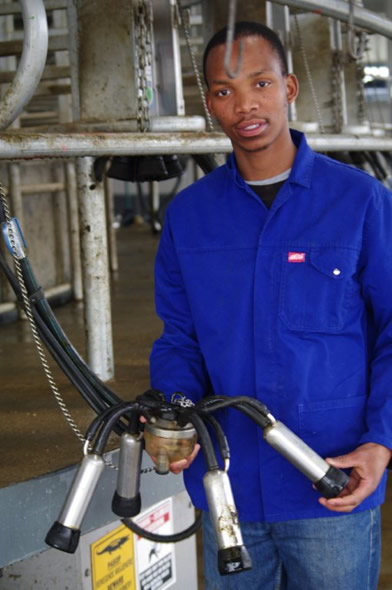
Ntshiza is the youngest dairy farm manager in KwaZulu-Natal and has big dreams to have his own dairy farm one day.
As a dairy farm manager at Mackenzie Farm in Ixopo Ntshiza manages a large dairy farm with three dairy sites. The dairy has more than 2 500 cows that produce 60 000 litres of milk a day.
Ntshiza told Vuk’uzenzele that he would not be where he is today if he had not met Judy Steward, the founder of Future Farmers Association.
Future Farmers Association gives young people in South Africa an opportunity to become commercial farm managers or farmers.
During Grade 11 Ntshiza and a friend used to train cows for animal shows.
“One day we were at the animal show in Pietermaritzburg Royal Showgrounds and we met Judy Steward the founder of Future Farmers Association. She showed interest in us and encouraged us to continue doing farming. After matric she called me to find out how I did at school and my plans going forward. I told her that my plan is to do farming. To my surprise she called a few days later to tell me that she had organised a scholarship for me to go and live, work and train on a farm overseas. In April 2006 I was at Schleswig Holstein College in Germany doing my studies,” he said.
When Ntshiza came back in 2007 he worked at Blue Mendel Farm in Mooi River as a dairy manager. In 2010 he joined Mackenzie Farm where he still works as a manager.
Ntshiza said when he joined Mackenzie Farm he faced challenges.
“Working in the farm is like any other job; there are challenges. The hardest challenge I had to overcome was the attitudes of workers especially older men. Older men in farms find it very difficult to take instructions from a young black manager. But I was able to win them over by staying calm, treating everyone with respect,” he said.
Ntshiza encourages young people to study agriculture because there are many opportunities in the sector.
“There is a misconception that farming is only for an uneducated person … which is not true. I have the qualification for my job. The truth is that farming is a highly specialised field anyone can go to,” he said.
Ntshiza said his goal now is to own his dairy farm. KwaZulu-Natal Agriculture and Rural Development MEC Cyril Xaba said at the recent Department of Agriculture Summit that there was no reason why Ntshiza would struggle to get funding to realise his dream.
“Ntshiza runs a high-tech milking operation. He was studying Business Management through Unisa to be able to successfully run a commercial operation. I’ve since learnt that he has completed his studies. People like Ntshiza should be priorities for funding,” said MEC Xaba.
Municipal Elections to take place in August
Municipal Elections to take place in August andilePresident Jacob Zuma has announced that the 2016 Municipal Elections will be held on 3 August 2016. This means that all eligible voters can exercise their democratic right on this day.
The President encouraged all eligible voters, particularly the youth who would be voting for the first time, to register to be able to vote in the elections. “We urge all those who are eligible to vote, register to vote and those who have not checked their names to do so, so that together we continue to re-affirm and deepen our democracy,” said President Zuma.
The Independent Electoral Commission (IEC) said the announcement by the President allows for detailed planning by all stakeholders including the IEC, political parties, government departments, voters, the media, observers and others. “The announcement of the election date is not the official proclamation of the Municipal Elections. This is scheduled to occur later and triggers the election timetable and a range of legislated events – including the official closure of the voters’ roll for the elections,” said the IEC.
The official closure of the voters’ roll for the elections is 18 May 2016. This means eligible voters can still register and update their registration and address details at their voting stations and at the IEC’s local offices until the official proclamation. Existing voters can check whether additional address information is required by SMSing their ID number to 32810 (at a cost of R1). They will receive an SMS with the name of the voting station where they are currently registered. Voters for whom incomplete address details are currently captured will receive a second SMS urging them to visit their voting station to update their details.
How to check your voting status
Voters can also check their status by dialing *120*432# or online: www.elections.org.za or call the Contact Centre on 0800 11 8000 between 7am and 9pm. To register or to update registration and address details, voters must complete a REC1 voter registration application form and present it in person at the voting station for the voting district in which they ordinarily reside. The form is also available online on: www.elections.org.za which voters can complete online, print a copy and bring it with them to their voting station. Voters without formal addresses must complete and sign an affirmation form (REC AS) accompanying the REC 1 form in which they attest to the fact they live in the relevant voting district. In municipal elections voters may only vote where they are registered and voters are reminded that it is a criminal offence to knowingly register in a voting district in which they are not ordinarily resident.
How to find your correct voting station
- Call the Contact Centre on 0800 11 8000 between 7am and 9pm
- Dial *120*432#
- Use the Voting Station Finder App on www.elections.org.za
All those visiting a voting station should have with them a valid South African ID - either a green bar-coded ID book, a smartcard ID or a valid Temporary Identity Certificate.
- Additional information from the Independent Electoral Commission
Strengthening SA’s social security net
Strengthening SA’s social security net andileWith over 16 million South Africans relying on social grants to get by, government is working hard to ensure those who are most in need receive the necessary support on an extended basis.
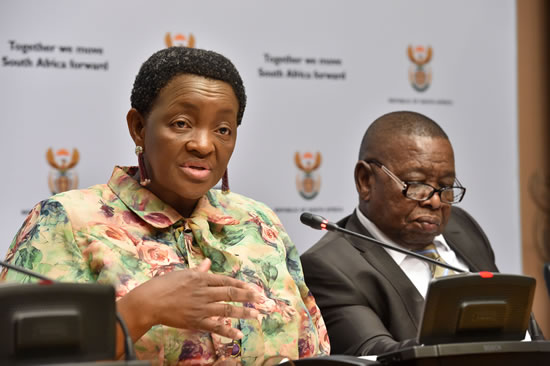 One of government’s top priorities is to ensure that vulnerable groups are taken care of and that there is adequate community and human development for all, explained Social Development Minister Bathabile Dlamini. Over the past 22 years, government has made a lot of progress in alleviating socio-economic challenges through interventions such as major investments in health, education and social security.
One of government’s top priorities is to ensure that vulnerable groups are taken care of and that there is adequate community and human development for all, explained Social Development Minister Bathabile Dlamini. Over the past 22 years, government has made a lot of progress in alleviating socio-economic challenges through interventions such as major investments in health, education and social security.
In an interview with Vuk’uzenzele, Minister Dlamini, who chairs the Social Protection and Community Development Cluster, said government has made strides in ensuring the overall welfare of vulnerable groups. The Minister said the entire cluster has been able to link up and work together to ensure that grant recipients are looked after and kept in the system from early childhood development (ECD) until they reach higher education. “What is important about this cluster is that you see the progress through the improvement of the quality of lives of people. For example, when children who receive social grants go to school they have something to eat at school [through the National School Nutrition Programme]. “If there is nothing at home, they will find it at school so there is a balancing act when it comes to our programmes,” she said.
Ongoing support for vulnerable groups
The Minister added that grant recipients within the system are tracked until they reach Grade 12, and the Department of Social Development ensures that the children are linked up with the Department of Higher Education and Training which is made aware of deserving students in the system. The Department of Social Development’s Isibindi model deploys trained community-based child and youth care workers in communities to provide care, protection and developmental support to vulnerable children and families. “The Isibindi model also feeds into education. For instance, 98 per cent of our children that fall under the Isibindi programme wrote exams.
“From this group a lot that obtained bachelors’ degree pass and almost all of them passed Grade 12,” she said. The rest are redirected towards Technical Vocational Education and Training colleges. Those who need assistance to improve their marks are also supported. “What we are trying to do is to follow the child from ECD onwards. Then we are able to see those who drop out of school, look for them and find out what the problem is. “We are no longer just giving grants out to young people, we also want to get outcomes and ensure that they go through the process,” explained Minister Bathabile.
ECD research and development
Minister Dlamini said government, through the National Development Agency, has entered into a partnership agreement with the recently established University of Fort Hare’s Early Childhood Development Centre of Excellence in the areas of ECD research and development. The centre of excellence has been set up to be an academic centre of both context-specific curriculum development and research in the area of ECD, and the university is working towards providing relevant, short learning courses, a Diploma in ECD and a Bachelor of Education.
Government also wants to ensure that cooperatives receive the necessary support to become more productive and create jobs. “We want to ensure that we increase our input when it comes to caregivers; we want them to serve in cooperatives and go to school; we want young women, who are practitioners in ECD, to train as full-time practitioners and we want to ensure that we improve the standard of ECD.” The Minister said one of government’s aims, going forward, is to ensure women are increasingly incorporated into the social cluster’s programmes.
Gauteng tackles racism head on
Gauteng tackles racism head on andileGauteng Premier David Makhura has introduced a 20-member team of eminent people to lead dialogues on racism and xenophobia across the province.
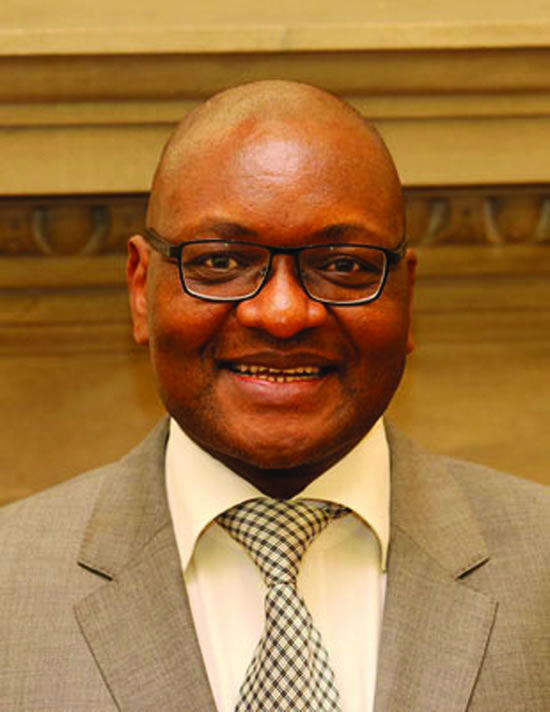 Working with various civil society initiatives, the team - known as the Eminent Group of Nation-Building and Social Cohesion Champions - will open honest and constructive conversations on how South Africans can build a society free from racism and xenophobia.
Working with various civil society initiatives, the team - known as the Eminent Group of Nation-Building and Social Cohesion Champions - will open honest and constructive conversations on how South Africans can build a society free from racism and xenophobia.
The team is chaired by Judge Yvonne Mokgoro and includes professors, judges, lawyers, church leaders and activists. Some of the prominent names include former IEC chairperson Brigalia Bam, Reverend Ray McCauley, Ambassador Welile Nhlapo, Professor Mary Metcalfe, Reverend Frank Chikane, Sello Hatang of the Nelson Mandela Foundation, Mavuso Msimang of the Oliver and Adelaide Tambo Foundation and Shan Balton of the Ahmed Kathrada Foundation.
The team will work with the Premier, provincial government, municipal mayors and leaders of civil society over the next three years to implement a comprehensive programme of social cohesion and nation building.
“We want to create institutional support and open up difficult conversations around racism. We want to take these conversations everywhere - in the townships, the suburbs, churches, mosques and universities,” said Premier Makhura. Mokgoro said the group consists of diverse people and she appreciated the selection of the team, which is committed to combatting racism and dealing with it objectively. The team will identify sectors of the community that will be targeted in continuing this conversation. The team will submit its first report within six months, based on the set terms of reference.
Let us build a better SA
Let us build a better SA andileFrom th e Union Buildings: A message from the President
e Union Buildings: A message from the President
“Where did you vote?”
For millions of South Africans, this simple question about 27 April 1994 sets off a flood of memories, equally heartwarming and heartbreaking about a unique day in our history; a day millions of South Africans personally signed the death notice of apartheid from the privacy of their voting booths. While recalling 27 April 1994 often generates warm and fuzzy stories and images of snaking queues of voters of all backgrounds, it also produces memories of a South Africa that is light years removed from the country in which we live today.
Think of where you lived at the time; of the type of job you had or your parents occupied; think of the quality of schools nearby, or the state of the roads in your village or township. Think of how many black South Africans you saw behind the counters at post offices, banks or supermarket tills. Think of what our airports or public transport systems looked like.
 Think of how many black families prepared themselves for their sons’ and daughters’ graduations, instead of celebrating the success of the offspring of their white employers. Think of the millions of South Africans who had no access to water or electricity, or couldn’t borrow money from banks who refused to recognise informal settlements as formal addresses.
Think of how many black families prepared themselves for their sons’ and daughters’ graduations, instead of celebrating the success of the offspring of their white employers. Think of the millions of South Africans who had no access to water or electricity, or couldn’t borrow money from banks who refused to recognise informal settlements as formal addresses.
On Freedom Day 2016 – 22 years after the eyes of the world were focused on the triumph and elation of the majority of South Africans – we all well advised again to cast back our minds and to appreciate the progress we have made as a free people. This Freedom Day, we will not only hear voices of celebration; we will hear voices of demand; voices of concern; voices that call for change. In a free and open democracy such as ours, such voices have a right to be heard. But with an open democracy comes the responsibility for all of us to listen to the voice deep inside ourselves that tells the story of how our lives, individually and collectively, have changed for the better during 22 years of freedom.
During 22 years of freedom, we have as South Africans worked together to build a better society and a stronger economy, but we have not yet succeeded in building an economy that truly belongs to and sustains – or is sustained by - the majority of South Africans. Freedom Month 2016 is therefore dedicated to “celebrating our freedom and democracy through radical economic transformation.” This focus acknowledges that while South Africans who were once divided have in the course of more than two decades built a fundamentally peaceful and harmonious society, we are still confronted by poverty, unemployment and inequality.
The need to develop the skills of all South Africans and place the economy in the hands of the majority of our people – as part of building an inclusive economy – is the most critical shortcoming of our nation’s development since 1994. In 2016, South Africa is not only challenged to meet the needs and aspirations of South Africans who qualified, based on their age, to be in the voting queues in 1994. We also have to provide for the post-1994 generation, millions of whom will share the voting queues with us for the first time in 2016.
An inclusive economy, that creates opportunity for all – from early childhood learning to post-graduate qualification – and which fully exploits the capability, passions and ideas of all South Africans is our most pressing priority. From broad-based black economic empowerment and employment equity, to the recently instituted Black Industrialists Programme and the priority given to local procurement on infrastructure projects, government is doing its best to kickstart radical economic transformation.
 As with everything in which our country has succeeded in the past 22 years, government is never alone – and does not want be alone – in moving South Africa forward. Our National Development Plan sets out the recipe for partnership among all sectors of our society in achieving a better life for all. All South Africans must put their shoulder to the wheel to develop a future that is even brighter than our shared achievement since 1994. Our future must draw inspiration from our past, and we must keep reminding ourselves of the challenges we have already overcome.
As with everything in which our country has succeeded in the past 22 years, government is never alone – and does not want be alone – in moving South Africa forward. Our National Development Plan sets out the recipe for partnership among all sectors of our society in achieving a better life for all. All South Africans must put their shoulder to the wheel to develop a future that is even brighter than our shared achievement since 1994. Our future must draw inspiration from our past, and we must keep reminding ourselves of the challenges we have already overcome.
In 2016, we are surrounded by anniversaries that illustrate the road we have travelled. This year is the 26th anniversary of the release of President Nelson Mandela from prison. It is also the 50th anniversary of the declaration by the National Party regime that District Six would be a whites only area, leading to the forced removals of more than 60 000 residents. The year 2016 also marks the 20th anniversary of the signing into law by Madiba, of the Constitution of the Republic.
It marks 60 years since the women’s march to the Union Buildings and 40 years since the landmark 16 June student uprising in Soweto.
Last month we commemorated 30 years since the ambush and brutal killing of the Gugulethu Seven by the apartheid police in March 1986. When we look back in 2016 on how life has changed in our country since 1994, we must all find the hope and inspiration to declare that we will build a better South Africa day by day, brick by brick until we realise our National Development Plan’s Vision 2030, which is just 14 years away.
Let’s get on with the work!
More houses for Kanana
More houses for Kanana andileLizzie Nhlapo’s dream has finally become a reality. The 69-year-old resident of Kanana in Hammanskraal, north of Pretoria, is one of the 500 residents who have benefited from a housing project of the Gauteng Department of Human Settlements.
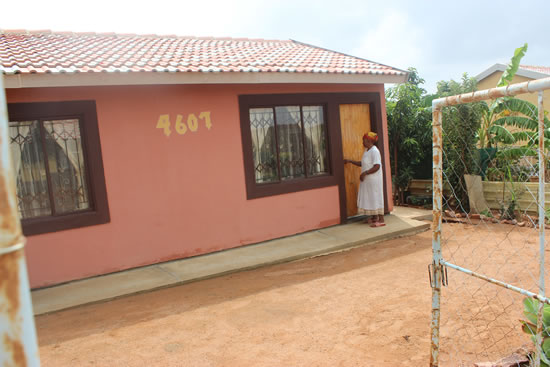 The housing project forms part of Ntirhisano, a Gauteng Provincial Government initiative that aims to improve government’s service delivery and create a public service that is responsive to the needs of the people.
The housing project forms part of Ntirhisano, a Gauteng Provincial Government initiative that aims to improve government’s service delivery and create a public service that is responsive to the needs of the people.
The project has not only brought much needed houses to the community, but has also created jobs for locals from Kanana. To date, 216 people have been employed. Of these, 80 are male, 22 are female and 114 are youth. Nhlapo is a pensioner who lives with two of her children and four grandchildren and uses her pension to support her family. She has lived in Hammanskraal since 2008, when she moved from Mpumalanga.
For many years Nhlapo dreamt of owning a house and in October last year she finally moved into her house. Before that she lived in a shack. Life was difficult because it was not built for all weather conditions. She said since moving into her house she no longer has to worry about rain or strong wind.
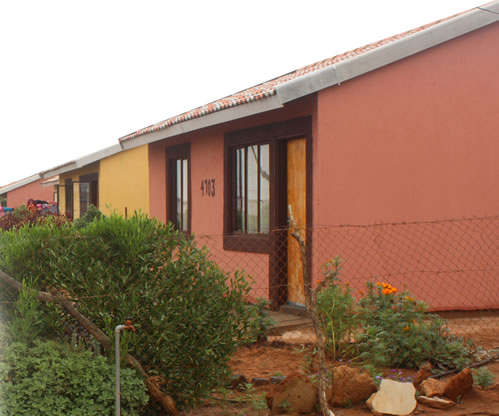 “There is a big difference, we are now able to cook, sleep and bath properly,” she said, pointing to her new four roomed house. Nhlapo had praised the provincial government and said she hoped it continued changing the lives of residents in Gauteng.
“There is a big difference, we are now able to cook, sleep and bath properly,” she said, pointing to her new four roomed house. Nhlapo had praised the provincial government and said she hoped it continued changing the lives of residents in Gauteng.
“I want to thank our government and especially the Premier. I hope it does not end here with the people of Kanana, but that they (government) keep doing the same for other people as well.”
Another beneficiary, Victoria Sepeng (39), lives in her new house with her two daughters and husband, less than one kilometre away from Nhlapo’s house. Before moving into her new house, she was renting a backroom in Kanana with her family. She said the new house gives everyone, especially her daughters, some privacy.
“Life is better now that we all have our own space, the girls share their own bedroom and my husband and I occupy the other room,” she said.
One of the things she enjoys most about her new house is being able to bath in a proper bathroom and having warm water in the tap consistently.
Working together to serve communities
Working together to serve communities andileTwo years ago, the Gauteng Provincial Government (GPG) introduced an integrated service delivery model aimed at changing and improving communication between government and communities.
 The model called Ntirhisano was also aimed at responding to the needs of the community quicker. Ntirhisano is a Xitsonga word meaning working together. The model is a collaborative service delivery model that aims to improve government’s service delivery and build an activist public service that is responsive to the needs of the people.
The model called Ntirhisano was also aimed at responding to the needs of the community quicker. Ntirhisano is a Xitsonga word meaning working together. The model is a collaborative service delivery model that aims to improve government’s service delivery and build an activist public service that is responsive to the needs of the people.
It also aims to empower communities to drive their own development. Ntirhisano is based on three pillars that respond to community issues, resolve service delivery challenges and grow Gauteng communities. These pillars are:
Respond: Government must timeously respond to service delivery queries, using interactive and innovative response systems. All spheres of government are working together to respond to each community’s problems. Government is on the ground solving problems directly with communities.
Resolve: The GPG service delivery approach has been modernised and changed to meet the needs of the people. Ongoing monitoring ensures that all service delivery projects are completed in time and handed over to the rightful communities.
Interventions are made where there are service delivery blockages in clinics, hospitals and housing projects. As an active government, the capacity for rapid response is enhanced to unblock service delivery problems and resolve community complaints, through Ntirhisano.
Grow: Government works with communities to find innovative sustainable solutions, leading to improved and more equitable socioeconomic development.
The programme also ensures that community members actively participate in community development in a constructive and proactive way to meet socio-economic needs.
Involving communities
Residents have a say in how they are run by participating in the Ntirhisano war room monthly meetings. The meetings include civil society and department representatives from all spheres of government. Communities also use the Ntirhisano war room as a one-stop shop for government information about planned government projects and programmes for their area from any sphere of government. The war room also offers the following:
- Residents can register new service requests with the Ntirhisano war room i.e. any service that an individual, household and community needs from any sphere of government.
- Residents can use the Ntirhisano war room to register service delivery complaints as a result of service failures from any sphere of government.
- Residents will have access to government through Community Workers who will visit their household once a month.
- Residents must insist on a case number for all service requests and service delivery complaints that are registered with Ntirhisano war room.
For more information citizens can call the Ntirhisano Hotline on: 08600 11000 or visit: www.gautengonline.gov.za
Municipalities must serve with care
Municipalities must serve with care lebangLocal Government
Communities across the country rely on their municipalities to provide them with access to basic services that will improve the quality of their lives. For this to happen, municipalities need to serve with care and respond to community concerns timeously.
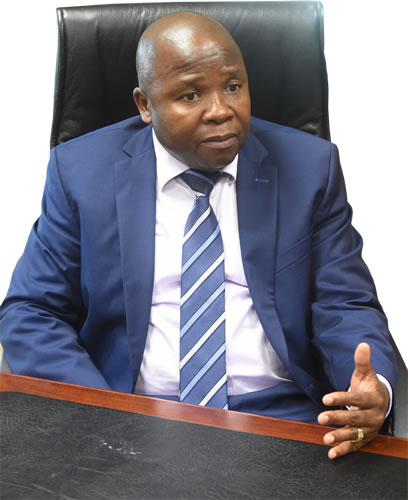 Cooperative Governance and Traditional Affairs Minister Des Van Rooyen wants to see more well-functioning municipalities across the country and is confident that the second phase of the Back to Basics Strategy will help achieve this.
Cooperative Governance and Traditional Affairs Minister Des Van Rooyen wants to see more well-functioning municipalities across the country and is confident that the second phase of the Back to Basics Strategy will help achieve this.
In September 2014, government announced that municipalities needed to go back to the basics of delivering services like fixing potholes, collecting refuse, fixing street lights and listening to residents, among others. This led to the introduction and implementation of the Back to Basics Strategy.
Going forward, Minister Van Rooyen said the second phase of the strategy would concentrate on helping dysfunctional municipalities become functional.
During his State of the Nation Address, President Jacob Zuma said as the Back to Basics Strategy moves into its second phase of implementation, national government would engage in more active monitoring and accountability measures.
This will include unannounced municipal visits, spot checks of supply chain management processes, the implementation of recommendations of forensic reports, site visits of Municipal Infrastructure Grant funded projects and increased interventions to assist struggling municipalities.
He added that a 10-point plan of back to basics priority actions has been developed to guide the next phase and this plan includes the promotion of community engagement, which is important to enable communities to provide feedback on their experience of local government.
Minister Van Rooyen explained that the first phase of the Back to Basics Strategy helped government understand the challenges faced by municipalities across the country.
The strategy also helped government come up with clear recommendations on how to deal with the challenges faced by these municipalities.
New solutions needed
While municipalities are traditionally known to provide basic services like electricity, water and sanitation, refuse removal, rehabilitation of roads, among others, metropolitan cities are fast becoming smart cities and are now going a step further and introducing innovation into their strategies.
“The thrust of our approach is new innovative solutions for all problems. If you speak of Wi-Fi and look at the rollout of broadband facilities and the benefit of this to young people in our tertiary institutions in our cities, this is a very positive achievement to be narrated.
“But as young people grow and as they want to access information in their area, they want new systems that will ensure that they won’t have to struggle to access information from sources of information like libraries.
“It is our argument that cities are built on the basis of sound economic development strategies. Without economic development in most of our municipalities, I don’t think most of our problems will be addressed,” said the Minister.
The ideal municipality
The Minister said his ideal municipality is one that can overcome its challenges and meet all the pillars of the Back to Basics Strategy.
He stressed that an ideal municipality must have a positive balance sheet.
“Ideally, we want a municipality that is functional, able to provide basic services, manage its resources appropriately, adhere to good governance practices, raise and manage its own revenue and deal with issues of debt management.
“We want a municipality that is able to give an audience to the people, because at the centre of a successful municipality is our communities,” he added.
Diepsloot residents welcome Ingonyama Bridge with relief
Diepsloot residents welcome Ingonyama Bridge with relief lebangDiepsloot’s R76 million Ingonyama Bridge, officially opened by Johannesburg Executive Mayor Councillor Parks Tau recently, has been welcomed with joy and relief by local residents, who have said it will help end the spate of accidents in the area and bring about travel convenience.
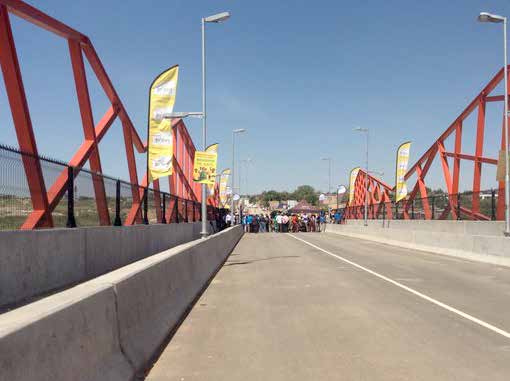 Ingonyama Road is a major access and connector road traversing the township. The bridge, over the Jukskei River, forms part of several multimillion-rand infrastructure development projects undertaken by the City of Johannesburg to bring about social and economic transformation in the area.
Ingonyama Road is a major access and connector road traversing the township. The bridge, over the Jukskei River, forms part of several multimillion-rand infrastructure development projects undertaken by the City of Johannesburg to bring about social and economic transformation in the area.
One of the residents who were relieved when the 60m-long overhead pedestrian and cycling bridge was officially opened recently was 44-year-old Jeanette Phakathi, a domestic worker at the nearby suburb of Dainfern.
Phakathi daily crosses the busy Ingonyama Road on her way to work and bears testimony to the multiple accidents that have taken place on the road, many of them involving pedestrians.
“I’m relieved that the City of Johannesburg has finally heeded pleas by the Diepsloot community for a bridge. The new bridge will make it easier for everyone. I cannot tell you how relieved I am that we finally have a bridge," she said.
Echoing her sentiments was Jessica Moyo, 38, who said she lost a friend after a speeding car ran over her early last year.
"This goes to show that the City has our interests at heart. It was very difficult to cross the Ingonyama Road on foot. Now we're walking on air," she said.
Sizakele Gumbi, 40, a mother of two, thanked the City for the intervention.
"We have children and you don’t know how stressful it was to send them on errands and they have to cross the notorious Ingonyama Road.
“Far too many accidents have happened on this road and what a relief this bridge will bring to everyone. We're very thankful," she said.
Ahead of the opening, Mayor Tau led a walkabout through the township, speaking to locals and assessing the progress development projects in the area. The official opening of the bridge - a project of the Johannesburg Development Agency, an infrastructure development entity of the City - was also attended by Development Planning MMC Councillor Ros Greeff and Health and Social Development MMC Councillor Nonceba Molwele.
“This bridge is an immense economic development enabler for the area,” said MMC Greeff says.
MMC Molwele said the new bridge would encourage Diepsloot residents to walk and cycle, which would benefit their health.
600 local councillors graduate
600 local councillors graduate lebangLocal government
The MEC for the KwaZulu-Natal (KZN) Department of Cooperative Governance and Traditional Affairs Nomusa Dube-Ncube has called on councillors in the province to continue empowering themselves with increased knowledge as they lead people in their communities.
 MEC Dube-Ncube was speaking during the graduation ceremony of close to 600 councillors who participated in the Accredited Councillor Training Programme (NQF level 3) recently.
MEC Dube-Ncube was speaking during the graduation ceremony of close to 600 councillors who participated in the Accredited Councillor Training Programme (NQF level 3) recently.
According to MEC Dube-Ncube, the aim of this course is to ensure that councillors are better equipped to deal with the challenges that they face at the coalface of service delivery.
“The understanding of key legislation that governs local government and the Constitution of the country is critical, so that they can be better able to lead their communities.
“The year that we are in is also an election year which means that some of these councillors might not be returning in the new administration. The skills and knowledge they have gained through this course ensures that they are still able to play a crucial role in the building of communities, no matter what role they occupy after the elections,” said MEC Dube-Ncube.
The key modules of the course included legislation, structures and functions, good governance and codes of conduct; municipal finance, municipal planning; municipal performance management systems; councillor oversight, and traditional governance and special projects.
Rhoy Adhika, a councillor from the Mtubatuba Local Municipality, said: “As a first-time councillor this course assisted me in understanding the municipality functions. I now understand my responsibilities better. I also understand how local government works and I am better equipped to carry out my responsibilities.”
Adhika said the course helped her understand how councillors’ decisions on service delivery affect the community.
“I now understand the critical bridge or link that we have as councillors in service delivery. We learnt about municipal finances which were very important when taking decisions,” said Adhika.
Adhika added that in any position it is important to understand the basics and that the course assisted with the basics of local government.
“I would also encourage other councillors to continue to equip themselves with knowledge for better service delivery.”
MEC Dube-Ncube also said the 21st century demands that councillors be at the cutting edge.
“We are happy to see councillors utilising social media and the Internet to engage their communities and to ensure that they are more accessible to their constituencies,” said MEC Dube-Ncube.
“We are moulding cadres who [are] selfless in the service of their constituency. A cadre who will unceasingly be guided by and subscribe to the Batho Pele principles. We are doing away with councillors who will not be asking which side is the bread buttered, but where duty lies,” she concluded.
Steve Tshwete Municipality gets Blue Drop status
Steve Tshwete Municipality gets Blue Drop status lebangLocal government
Steve Tshwete Local Municipality has retained its Blue Drop status and continues to be the top-performing municipality in Mpumalanga in this regard.
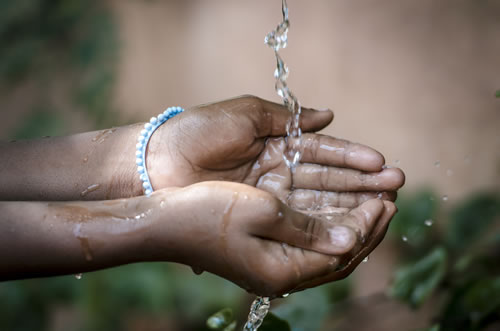 Prudence Magutle, spokesperson for the municipality, said its Blue Drop status is a clear indication of the service provided to communities to ensure that they enjoy quality drinking water.
Prudence Magutle, spokesperson for the municipality, said its Blue Drop status is a clear indication of the service provided to communities to ensure that they enjoy quality drinking water.
“Blue Drop status encompasses so much more than water quality alone, it includes service delivery in its entirety, from qualified competent staff to maintenance,” said Magutle.
The Blue Drop Certification Programme, led by the Department of Water and Sanitation, allows for proactive management and regulation of the quality of drinking water based on legislated norms and standards, as well as international best practice.
Magutle added that this is the fourth time that Steve Tshwete Municipality has achieved Blue Drop status.
“We have achieved Blue Drop status in 2010, 2011, 2012 and now 2014.”
Magutle said Steve Tshwete Municipality has a committed chemical analyst who took ownership of the whole process to obtain Blue Drop status.
“Our analyst ensures compliance with all the requirements of the Department of Water and Sanitation for Blue Drop Certification, taking ownership of our duties and doing our utmost to performing with excellence.”
According to the Department of Water and Sanitation, for the 2014 Blue Drop report, the municipality attained a score of 97 percent and five of its systems got Blue Drop certification, namely Hendrina, Middelburg/Mhluzi, Komati Power Station, Arnot/Rietkuil Power Station and the Hendrina Pullenshope Power Station.
The incentive-based regulation Blue Drop Certification Programme was developed in 2008.
It involves the auditing of municipal water supply systems based on defined assessment criteria per audit cycle.
The assessment criteria includes drinking water quality compliance, as prescribed by the South African National Standards, and water safety planning, which focuses on risk management.
As part of its effort to implement water conservation and demand management, the Department of Water and Sanitation introduced the No Drop criteria in the audit cycle, which contributed three per cent to the overall Blue Drop score.
The No Drop criteria involves water use efficiency and water loss management within a system and will assist municipalities to reduce the high volumes of water lost during purification and distribution.
Magutle said that it was not easy to get Blue Drop Certification, and it required hard work and dedication.
“Initially, the task of monitoring and collecting information and data seems impossible and daunting.
“Once you take the first step regarding the criteria, you need to maintain effective monitoring systems, from analysis data to incident protocol. Allow the system to lead you,” she advises other municipalities.
She also encouraged management of municipalities to support and aspire to get Blue Drop status, which is in the best interest of community members.
SA, Chinese cooperation agreement boosts education
SA, Chinese cooperation agreement boosts education JoyExploring the world of astronomy is now a reality for learners from Gauteng and surrounding areas, thanks to the Chinese government’s donation of a planetarium to the Department of Basic Education (DBE).
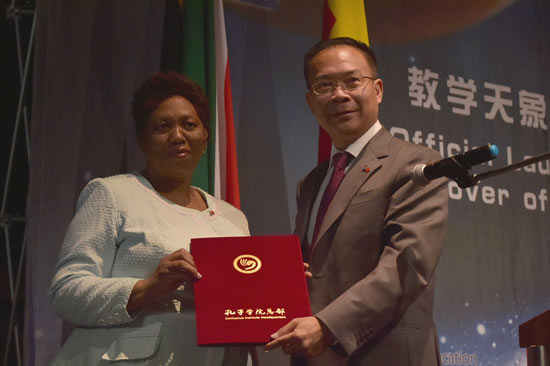 A planetarium is a theatre made for educa-tional and entertaining shows about astronomy.
A planetarium is a theatre made for educa-tional and entertaining shows about astronomy.
Situated at the Sci-Bono Discovery Centre in Johannesburg, the centre hopes to grow interest in science, mathematics and technology among learners.
The planetarium will benefit learners and community members who will get an opportunity to learn about the development of the telescope through entertaining, educational 3D movies and other things. Learners will also enjoy shows that include spacebound viewing of the universe through night software.
The planetarium caters for 30 people per show and the shows are between 30 and 45 minutes long.
Speaking at the official launch of the planetarium recently, Basic Education Minister Angie Motshegka said she wanted learners to learn as much as possible about celestial bodies – the planets, stars, moons, comets and asteroids.
“It’s important to learn about how they affect our own planet and how they could affect it in future. This sums up the importance of the planetarium,” said Minister Motshekga.
She added that the donation was part of an ongoing agreement signed by the South Africa and China.
In 2013 two countries signed a cooperation agreement that ensures South Africa learns from China about curriculum development and implementation, mathematics, science and technology education, teacher training and development, vocational education and training, research and development to improve training.
Li Song, who represented China, said there are sound relations between the two countries. He added that he was pleased that South Africans were learning the Chinese language, Mandarin.
“The planetarium will enhance maths, science and technology and further promote working relations with South Africa,” he said.
Curriculum development and implementation
The Minister said as part of curriculum development and implementation, the Gauteng Department of Education is piloting the teaching of Mandarin in South African schools, mainly in the Tshwane South District.
“There are 14 schools which are currently teaching the Chinese language and 13 new schools have been proposed for 2016.”
During the event, the Chinese government also donated 2 000 textbooks, which will help in the teaching of Mandarin in schools until a South African textbook is developed.
“We are also looking at establishing e-Learning classrooms for the pilot schools teaching Mandarin. We want our children to be able to communicate on an international scale,” she added.
Teacher training and development
 With regard to teacher training and development, Minister Motshekga said the Chinese government had committed to organising experts to compile Chinese language textbooks that were suited to South African conditions.
With regard to teacher training and development, Minister Motshekga said the Chinese government had committed to organising experts to compile Chinese language textbooks that were suited to South African conditions.
“The Chinese government will also send 100 teachers and volunteers every year, for the next five years, to mentor and support local teachers of Mandarin. They will train 200 local Chinese language teachers each year, for the next five years, through local Confucius Institutes and provide Confucius Institutes’ Scholarships in China.”
The Confucius Institute is a non-profit public educational organisation affiliated to the Ministry of Education of the People’s Republic of China. Its aim is to promote Chinese language and culture.
The Chinese will also send a language advisor to work on setting up systems for the introduction to teaching Chinese language in South African schools.
The Chinese government has also committed two scholarships to the DBE.
“Already, the Chinese government has availed two spots in its annual scholarship opportunities offered to South Africa. The DBE is working with the Department of Higher Education and Training to select the two candidates for the scholarship.”
“These scholarships will be for two students, for a full teaching qualification in China. The DBE will select two matriculants to take up two spaces,” said Minister Motshekga.
IDC boosts performance of township school
IDC boosts performance of township school JoyA partnership between the Industrial Development Corporation (IDC) and Ngwathe Secondary School, in Edenville just outside Kroonstad in the Free State, has helped the school to improve its matric results.
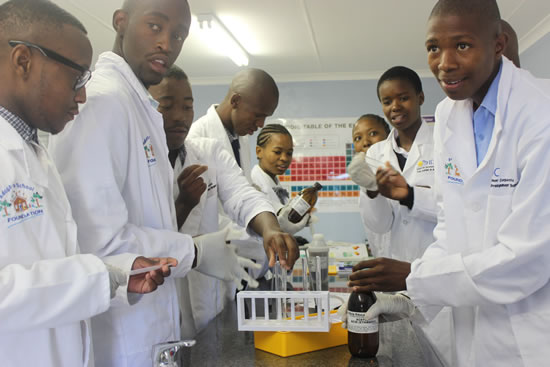 Since the IDC adopted the school in 2013, it has achieved over 80 per cent in its matric results. The school is one of the many in the country that have been adopted by the IDC under its Whole School Development Programme.
Since the IDC adopted the school in 2013, it has achieved over 80 per cent in its matric results. The school is one of the many in the country that have been adopted by the IDC under its Whole School Development Programme.
The Whole School Development Programme selects and injects resources and human capital into poor and underperforming rural schools across the country to assist the learners and teachers to reach their full potential.
School Principal Motshidisi Tumisi said since the start of the partnership between the school and the IDC in 2013, things have improved.
“There’s a lot of changes since we started the relationship with the IDC. The first thing they did for us was to develop our teachers. This happened after we sat down with them in a strategic planning session and identified our needs and told them what we would like them to help us with.”
After the strategic session the IDC adopted the school and undertook to do major changes. Among other things, the IDC developed teachers, built a science laboratory, introduced learners to the Cell C Take a Girl Child to Work Programme, donated sanitary towels to female learners and built a kitchen.
The school currently has 388 learners. Of these, there are six Grade 10 classes, three Grade 11 classes and three Grade 12 classes.
For the past seven years teaching science learners was a challenge for mathematics and science teacher Frans Mmotong.
But since the laboratory was built, he looks forward to his lessons and he has seen the level of interest in his students rising.
“This lab has brought a lot of changes and it helps learners when it comes to experiments because before it was built, we were struggling to do experiments.”
Grade 12 learner at the school Moleboheng Makhanye said the laboratory has made a big difference and she enjoys her science lessons.
“Since the IDC built the laboratory, doing experiments is simpler and enjoyable. I also look forward to the classes because we can see what we are talking about in real life.
“When the teacher talks about sodium chloride, we can relate because it is something that we see.”
Makhanye believes the presence of the laboratory will help her to realise her dream of becoming a medical doctor.
Makhanye’s sentiments are echoed by her classmate, Palesa Nkomo, who said learning science has become more enjoyable.
“We do enjoy the lessons now, we no longer rely much on textbooks and doing things practically is effective.”
She said on completing matric, she would like to study for a degree in medicine and specialise in cardiology.
With the IDC’s Whole School Programme, Mmotong and his learners can now enjoy mixing chlorine, sodium and other chemicals
National Health Insurance: Have your say
National Health Insurance: Have your say Estelle GreeffWhat is NHI?
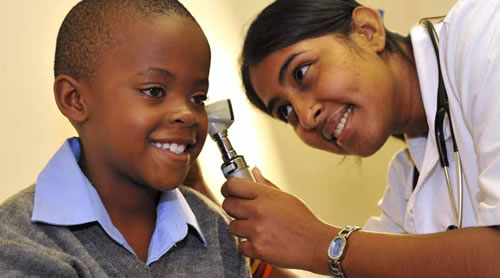 The National Health Insurance (NHI) is a health financing system that is designed to pool funds to put quality, affordable personal health services within reach of all South Africans based on their health needs, irrespective of their socio-economic status.
The National Health Insurance (NHI) is a health financing system that is designed to pool funds to put quality, affordable personal health services within reach of all South Africans based on their health needs, irrespective of their socio-economic status.
The insurance aims to ensure that every South African can enjoy comprehensive healthcare services free of charge at accredited health facilities such as clinics, hospitals and private health practitioners using an NHI card.
These services will be delivered through certified and accredited public and private providers to improve access. The services will be delivered closest to where people reside or work.
How the NHI will be funded
The insurance scheme will be established through the creation of a single NHI Fund that will buy services on behalf of the entire population.
NHI will be funded through a combination of various mandatory pre-payment sources, primarily based on general taxes.
This funding mechanism will ensure income cross-subsidisation between the rich and the poor, between the healthy and the sick, between the employed and unemployed, and bet
User fees or co-payments will not be charged when you use the services covered under NHI.
NHI coming into operation
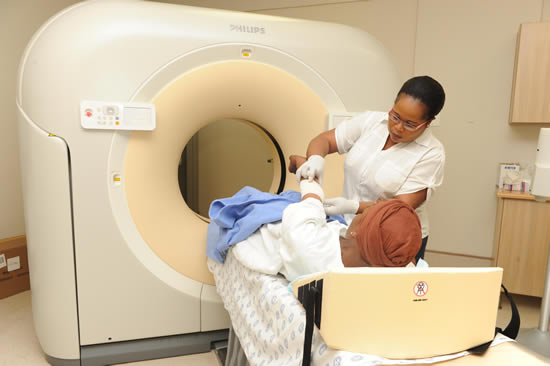 NHI will be implemented in three phases over 14 years. Pilot projects started in 2012 in 10 districts around the country. The first phase extends from 2012/13 to 2016/17.
NHI will be implemented in three phases over 14 years. Pilot projects started in 2012 in 10 districts around the country. The first phase extends from 2012/13 to 2016/17.
The pilot sites are Dr K Kaunda in North West, Pixley ka Seme in the Northern Cape, Thabo Mofutsanyane in the Free State, Eden in the Western Cape, OR Tambo in the Eastern Cape, Gert Sibande in Mpumalanga, Vhembe in Limpopo, Umzinyathi and Umgungundlovu in KwaZulu-Natal and Tshwane District in Gauteng.
The Ideal Clinic programme is being implemented, and health establishments will be inspected and certified by the Office of Health Standards Compliance (OHSC).
The first phase will include reviewing, amending and enacting legislation on NHI; establishing the NHI Fund; implementing population registration so that people can receive an NHI Card; refining clinical protocols and treatment guidelines; developing reimbursement strategies such as the diagnosis-related groupers; beginning the certification process by the OHSC; accrediting service providers by the NHI Fund in preparation for contracting with NHI; and developing processes for monitoring and evaluation.
The second phase of NHI implementation will include, among others, putting into use a fully functional NHI Fund and its governance structures; and determining and mobilising additional revenue
The last phase of implementation will include expanding certification and accreditation to private providers so that they are ready to contract with the NHI Fund.
Registering for services under the NHI
To register for NHI, you must go to an officially designated registration facility. The registration facilities or centres will be announced when the registration process starts. The facilities will issue NHI 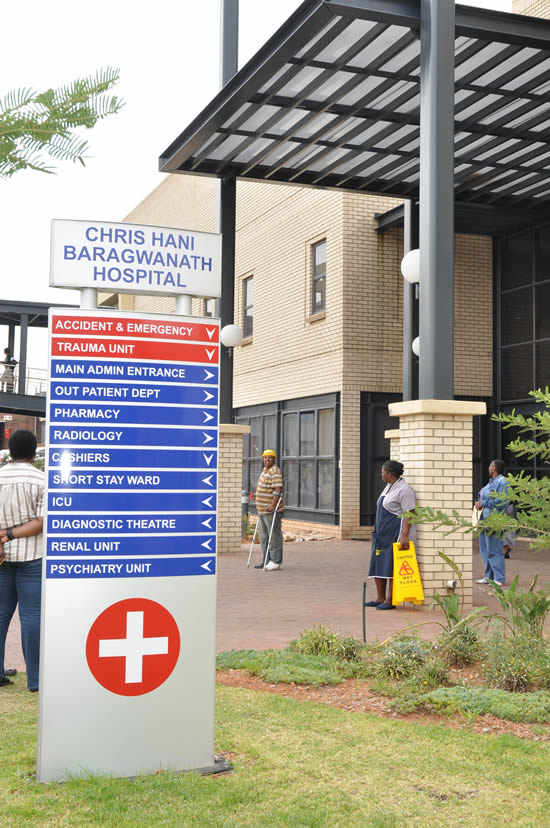 cards.
cards.
Vulnerable groups – such as women, children, older persons and people with disabilities, orphans, adolescents and rural populations – will be prioritised for registration.
South African citizens and permanent legal residents must produce their South African IDs and/or identity cards when registering for NHI.
Refugees and asylum seekers must produce their passports and/or official permits confirming their status.
NHI will ensure that you are able to access health services as you move throughout the country.
Role of medical schemes under NHI
Medical schemes will still exist under NHI. However, as NHI is gradually implemented, the role of medical schemes will slowly adapt to the transformed NHI environment.
No one who is eligible to pay NHI taxes can opt out of paying these taxes even if they choose not to use services that are bought through NHI. In the long run, medical schemes will eventually offer top-up health insurance for services that are not part of NHI benefits. This could include payment for medicines not covered by NHI.
Membership of medical schemes will be voluntary.
Services that are not covered under the comprehensive NHI service benefit will be paid for by the patient or through top-up cover offered through the evolved medical scheme of your choice.
Primary Health Care under NHI
Primary Health Care (PHC) will form the basis of NHI as it will be the level of care most accessible to the population.
PHC services will be bought from accredited public and private healthcare providers. Accredited private healthcare providers will be required to be organised into multidisciplinary practices that are able to deliver comprehensive PHC benefits. The quality of services at the PHC facilities will be improved through the Ideal Clinic model.
* By the Department of Health.
Public consultations on the NHI are ongoing. For comments and for points of further clarity on the White Paper on NHI please contact:
Department of Health
Private Bag X828
Pretoria 0001
Contact: Tel: 012 395 9248
Email: nhi@health.gov.za
Together we can stop the spread of TB
Together we can stop the spread of TB JoySouth Africa has made some great strides in TB prevention and treatment in the past five years and since the launch of a comprehensive TB testing and counselling campaign.
The massive TB screening campaign, launched last year by Deputy President Cyril Ramaphosa, received a positive response particularly in correctional centres and the mining community.
Up until December 2015, the National Department of Health was able to provide screening to over 400 000 people living in the six peri-mining districts in South Africa.
Tuberculosis is one of the major diseases that are responsible for illness and death worldwide.
In South Africa TB kills 80 percent of HIV positive people, and it is responsible for 120 000 deaths annually. Government wants to reduce this number to less than 20 000.
To address this challenge, last year during TB month government launched a three-year massive TB screening programme, similar to the HIV counselling and testing campaign rolled out in 2010, to reduce the number of new infections and related deaths.
Together we can stop the spread of TB by getting tested and learning more about the disease.
Here are a few tips to help you get started:
What is TB?
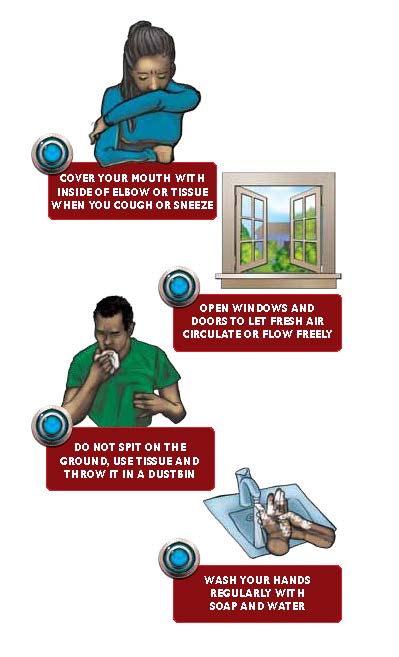 TB is a disease caused by germs that are spread from person to person through the air. TB usually affects the lungs, but can also affect other parts of the body, such as the brain, kidneys or the spine.
TB is a disease caused by germs that are spread from person to person through the air. TB usually affects the lungs, but can also affect other parts of the body, such as the brain, kidneys or the spine.
How is TB spread?
When a person with TB of the lungs coughs, sneezes, speaks or sings, TB germs from the lungs are expelled into the air. TB germs can survive longer in a dark enclosed place and remain suspended in the air for several hours. These germs can be inhaled by anyone who shares the same air and then cause infection.
How can TB infection be prevented?
TB can be prevented by:
- Covering your mouth and nose when sneezing or coughing
- Opening windows and doors at home and in crowded rooms, churches, buildings and taxis
- Exercising regularly
- Eating healthy food
- Stopping smoking
- Avoiding alcohol
- Visiting the clinic if you have been in contact with someone with TB or if you have any of the symptoms of TB.
How do I know if I have TB?
You may have TB if you have any of these symptoms:
- A cough for two weeks or more
- Night sweats
- Unexplained loss of weight
- Fever
Can TB be cured?
Yes, TB can be cured if treated early. You should take the medicine for at least six months. It is very important to take the medicines as prescribed and finish all of them.
Why must the treatment be taken for a full six months?
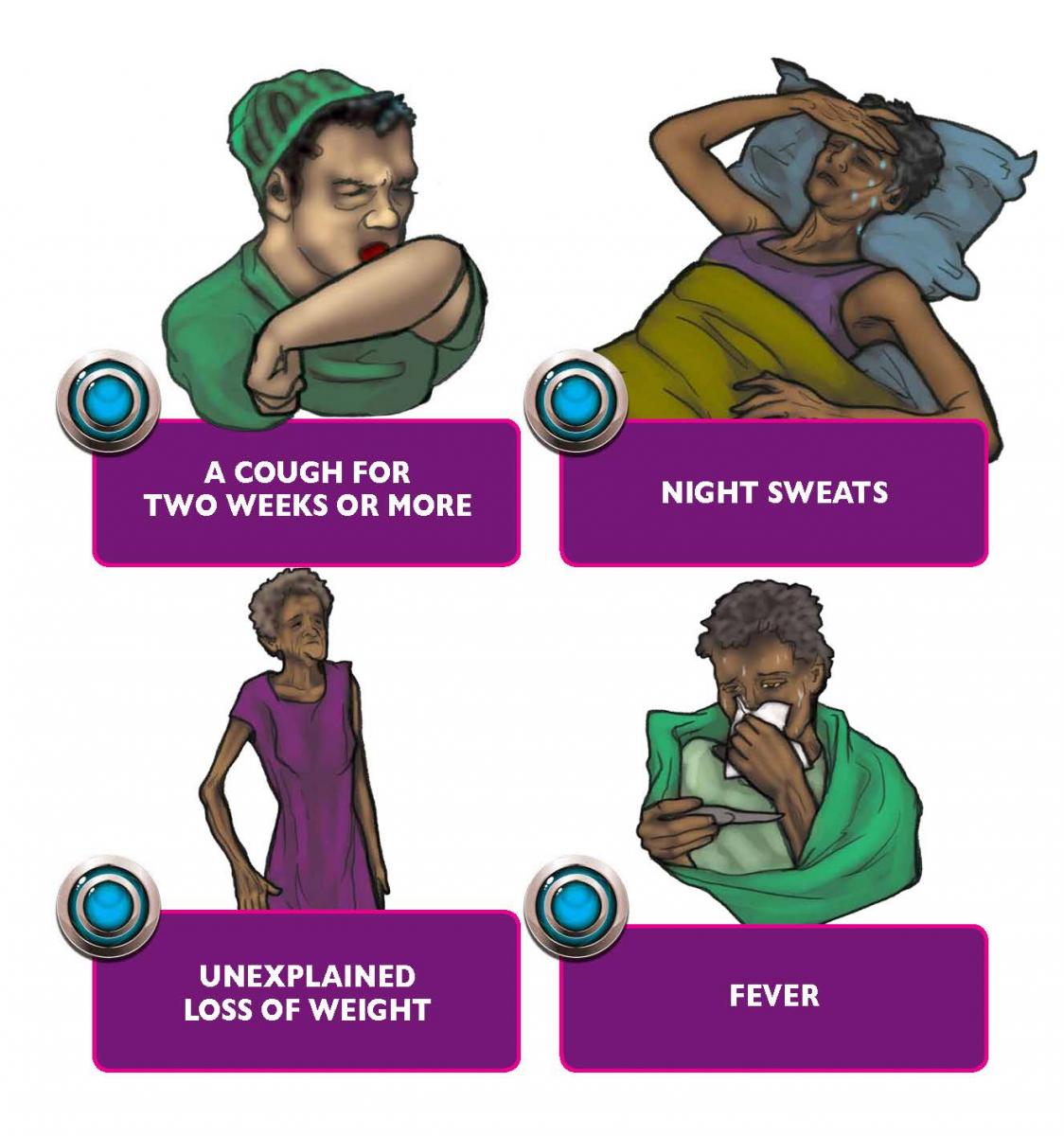 This is because the TB germ is difficult to kill. A combination of four different medicines is used to treat TB disease to make sure that all the germs hiding in the different parts of the body are killed. Even though you will start feeling better and your symptoms will go away after two weeks of taking treatment, do not stop taking the medicines. If you stop taking anti TB medicines too soon, you could get sick again. You could also get a kind of TB that will not respond to the common medicines used to treat it (Drug-Resistant TB).
This is because the TB germ is difficult to kill. A combination of four different medicines is used to treat TB disease to make sure that all the germs hiding in the different parts of the body are killed. Even though you will start feeling better and your symptoms will go away after two weeks of taking treatment, do not stop taking the medicines. If you stop taking anti TB medicines too soon, you could get sick again. You could also get a kind of TB that will not respond to the common medicines used to treat it (Drug-Resistant TB).
Can I use tradtional medicine to cure TB while on TB treatment?
No, you must not use traditional medicine together with TB medicine because this may cause other side-effects or prevent TB medicines from working well. It is important to take your TB medication every day for six months to be cured, and to stop using traditional medicine while taking TB treatment.
TB and HIV
People who are living with HIV are more at risk of getting TB infection and disease. If you are HIV-positive you must report symptoms of TB and request to be tested at your nearest clinic. If you have TB, and are HIV-positive you can be started on antiretroviral treatment early to improve your response to TB medicines and prevent death. If you do not have TB, you can be started on TB preventive treatment. This treatment will help prevent you from getting TB disease. You must get tested for HIV and know your status.
How can TB infection be prevented?
- Cover your mouth with inside of elbow or tissue when you cough or sneeze
- Open windows and doors to let fresh air circulate or flow freely
- Do not spit on the ground, use tissue and throw it in dustbin
- Wash your hands regularly with soap and water
How do I know if I have TB?
- A cough for two weeks or more
- Night sweats
- Unexplained loss of weight
- Fever
For more information about TB TB and drug-resistant TB contatct the national or provincial health office:
- National TB control programme: 012 395 8815 / 8074
- Eastern Cape 040 608 0814/1408
- Free State 015 408 1429/1588
- Gauteng 011 355 3098
- KwaZulu-Natal 033 935 2918/2586
- Limpopo 015 290 9188
- Mpumalanga 013 766 3046
- North West 018 387 1921/8
- Northern Cape 053 830 0529
- Western Cape 021 483 3647/5432
Marula plant a first for KZN
Marula plant a first for KZN JoyA new Marula Processing Plant in KwaNgwanase, uMhlabuyalingana, north of KwaZulu-Natal, will give the rural town an opportunity to grow the agriculture sector in the area.
The plant has become a beacon of hope and is set to grow community development and change lives, not only in KwaNgwanase but also in the province at large.
In 2012/13 the KwaZulu-Natal Department of Agriculture and Rural Development (KZN DARD) committed to build a structure that would see the people of uMhlabuyalingana maximising the output of natural resources, in particular the Marula plant, to participate in the agricultural economy and ensure the production of arable land and sustainable food security.
The KZN DARD launched the R30 million Marula Processing Plant for the production of marula jam and essential marula oils. The KZN DARD contributed R25 million towards the building of the structure, while the Department of Rural Development and Land Reform contributed R5 million for a destoning machine, which has the ability to extract oils off the marula plant pips.
Once the processing plant is fully operational it will create close to 50 direct employment opportunities in primary production.
Currently about 49 sites have been identified in the area to supply the primary stock to the plant. The department is also busy with research into a cultivar that will see the marula plant moving from its wild status into a more controlled commodity for enhanced production.
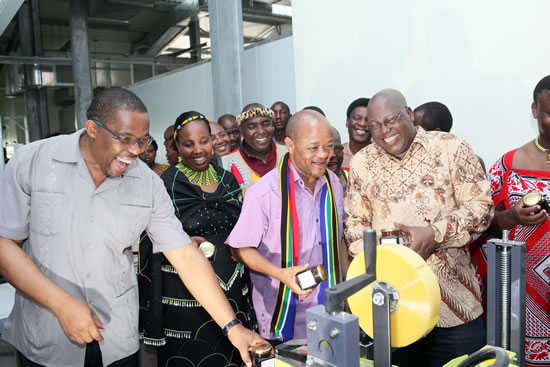 Speaking at the opening of the plant Agriculture and Rural Development MEC Cyril Xaba said agriculture was becoming a science and business that was integral to the department’s new strategy.
Speaking at the opening of the plant Agriculture and Rural Development MEC Cyril Xaba said agriculture was becoming a science and business that was integral to the department’s new strategy.
“Such a structure realises our exact goal, a lot of by products now will come out of this plant, which will enhance the value chain and create more jobs and participation in the agricultural economy from the people of KwaNgwanase,” said MEC Xaba.
Inkosi Mabhudu Tembe from the KwaNgwanase Tribal Authority said the dreams of the people of KwaNgwanase and the province were being realised one step at a time, which allows the communities to grow with the development.
“Our government heeded our call, hence today we see factories coming to our communities. Marula will change our lives for the better, like never before. In the area, we are stricken by a high unemployment rate. Our youth are sitting at home with qualifications. But now they will be working in marula plant processing,” he said.
Putting the empowerment of youth first
Putting the empowerment of youth first JoyYouth matters
Youth development determines the future and should be the heartbeat of any developmental agenda, says Deputy Minister in The Presidency for Planning, Monitoring and Evaluation Buti Manamela.
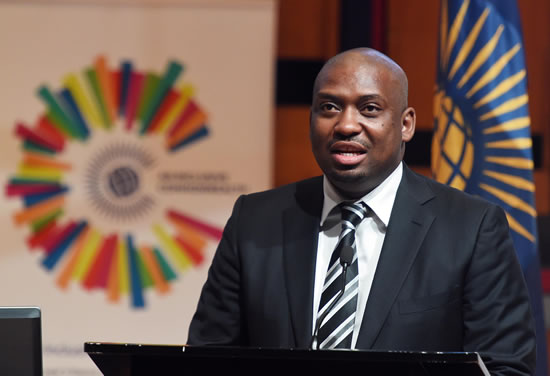 Speaking at the Second Commonwealth Conference on Youth Work in Pretoria recently, the Deputy Minister said the youth no longer want to be characterised as excluded, forgotten, marginalised or disadvantaged, because of policies that do not put them first.
Speaking at the Second Commonwealth Conference on Youth Work in Pretoria recently, the Deputy Minister said the youth no longer want to be characterised as excluded, forgotten, marginalised or disadvantaged, because of policies that do not put them first.
South Africa hosted the conference, which aims to empower youth to become agents of development and peace in their countries, through competence and professionalisation of youth work.
The conference hosted about 300 delegates from about 53 member governments and took place under the theme: “Engaging Youth People in Nation Building – the Youth Workers’ Role”.
“The youth want changes that open possibilities for them to improve their socio-economic status and quality of life. Regardless of whether they are from a developing or developed country, young people are affected by similar problems of marginalisation,” said Deputy Minister Manamela.
He added that the time has come to put youth at the centre of sustainable national development, but this cannot be done without youth workers who play a role in ensuring that youth development is prioritised.
“This work cannot take place without effective youth development policy, programmatic initiatives, youth development research and effective youth workers.
“In South Africa, the process of professionalising youth work started officially in the late 1980s. A Youth Practitioners Advocacy Group was established in 1994, which later became the South African Youth Workers Association.
“The South African Youth Workers Association consulted and collaborated with the Professional Development of Youth Work Consortium to facilitate the professionalisation process,” he added.
Development of professional youth workers
Commonwealth Secretariat Deputy Secretary-General Deodat Maharaj pointed out that the world was changing fast, and if many developing countries did not adjust, they risked being eclipsed in the new world order.
“However, to adjust, excel and advance human development in this new global disposition we need to leverage the sum total of all resources available to policy makers, the most valuable being human resources,” said Maharaj.
He noted 70 percent of Africa’s population was classified as youth.
“Young people are confronted with a range of challenges including high levels of unemployment, lack of access to quality education, rising crime and violence. In many of our member states, youth unemployment is still high,” Maharaj noted.
He said investing in the development of professional youth workers would, at the levels of local and national government, bring together professionals with the right skills and competencies to enrich, equip and build a youthful future.
Learning from others
Another speaker at the conference, Vice Chancellor of Unisa and Principal Professor Mandla Makhanya, said youth work needs to be promoted and professionalised in South Africa by exploring practices from around the globe.
Prof Makhanya said youth in many parts of the world face challenges such as limited resources, more especially education, training, employment and other economic development opportunities.
In South Africa, government, Unisa, the Commonwealth Secretariat and other stakeholders are ensuring that youth work is mainstreamed across all ministries.
Commendable progress has been made in advancing youth development locally, but a lot still has to be done to remedy the situation facing the country’s youth.
The Vice Chancellor said youth development has to become a feature in South Africa and beyond, because if youth are left in society’s margins all in society will be impoverished.
Youth making a difference
One of the delegates at the conference, Miguel “Steppa” Williams from the Caribbean, who was the winner of the 2015 Commonwealth Youth Worker of the Year, spoke to Vuk’uzenzele about the work his foundation is doing for his community in Jamaica.
He said the foundation, the Professional Youth Work Association, runs a project targeting young people who are against the law and out of school, aged between 16- and 30-years-old. The foundation’s work includes efforts to help build a cohesive nation.
“The main objective of the foundation is to reduce incidences of recidivism, improve life skills, training youth in product development, improving youth ability to matriculate to certified training, and improving relations between the police, youth and community,” explained Williams.
Through the foundation, about 25 youth completed all their modules, eight were employed in social enterprise and 15 transitioned to certified training.
He added that the foundation has partnerships with police, civil society groups, international development partners and ordinary people.
Private-public partnership a game changer for Mpumalanga youth
Private-public partnership a game changer for Mpumalanga youth Estelle GreeffYouth matters
A private-public partnership could see 2016 become a watershed year for a handful of young Mpumalanga entrepreneurs.
 South African Breweries (SAB) KickStart has partnered with the Mpumalanga Provincial Government in hosting the Mpumalanga Youth Entrepreneurship Programme (MYEP), which will see eligible participants receiving mentorship and capital funding.
South African Breweries (SAB) KickStart has partnered with the Mpumalanga Provincial Government in hosting the Mpumalanga Youth Entrepreneurship Programme (MYEP), which will see eligible participants receiving mentorship and capital funding.
“The programme will demonstrate growth, sustainability and the impact of innovative public-private collaboration for sustainable job creation and economic growth for the country,” said Simphiwe Mntambo, Enterprise Development Specialist (Youth Business) at SAB.
Thomas Msiza, spokesman of the Mpumalanga Department of Economic Development and Tourism, said it is important for government and the private sector to ensure that there is collaboration in an effort to empower the youth.
“The SAB-Kickstart programme comes at a time when our province is experiencing 37 percent (Stats SA) youth (15-34 years) unemployment, with 41.9 percent of female unemployment. We hope that through this programme, we will be able to make progress in helping the youth gain important skills that will help them start and grow their own businesses and employ other youth, therefore contributing meaningfully to employment creation and growing the provincial economy.”
Over 250 applications were received in the first week, with double that eventually applying. The process of sifting and shortlisting got under way immediately after the extended closing date of 25 February and the first 50 youth from Ehlanzeni began their three-day boot camp at Sanibonani Lodge in the first week of March.
MYEP seeks to develop and support youth entrepreneurs in all districts of Mpumalanga to become successful entrepreneurs through start-up training, mentorship and seed capital.
“The initiative is intended to make a tangible and sustainable impact on the fragile lives of many start-ups owned by young South Africans residing in Mpumalanga. The young men and women selected demonstrate evidence of how serious SAB and government are about youth business in South Africa,” says Mntambo.
The partnership is expected to be long-term, says Mntambo, adding that this pilot programme will dictate future developments.
MYEP was devised though a partnership formed in 2015 between the Mpumalanga Government, led by Premier David Mabuza, and the SAB, led by CEO Mauricio Leyva. Using the SAB KickStart programme, an investment of R1 million was made, with government co-investing R500 000 to help assist young entrepreneurs in the province build sustainable small businesses.
MYEP is linked to enterprise, rural and human capital development, and targets youth-owned SMMEs and cooperatives in three districts of the province.
Each district will hold a three-day boot camp for 50 youth entrepreneurs selected at pitching clinics held in those districts. SAB KickStart will aid the successful entrepreneurs with seed capital to expand their businesses.
The programme will also identify nine young entrepreneurs with the intention of providing seed capital, high-level mentorship and business development support for four months.
Victor Mashego, Acting National President of the Youth Chamber of Commerce and Industries SA, and the project manager of the Mpumalanga Youth Biz Portal says that South Africa relies on SMMEs to combat the challenges faced by the youth.
“Through initiatives like this, more SMMEs will be created which will then assist to bring down youth unemployment in our society. We urge the youth to maximise the opportunities that are created for them.”
Oasis centre for people living with disability
Oasis centre for people living with disability Estelle GreeffThe Department of Social Development (DSD) has launched a centre that will go a long way towards changing the lives of people with disabilities.
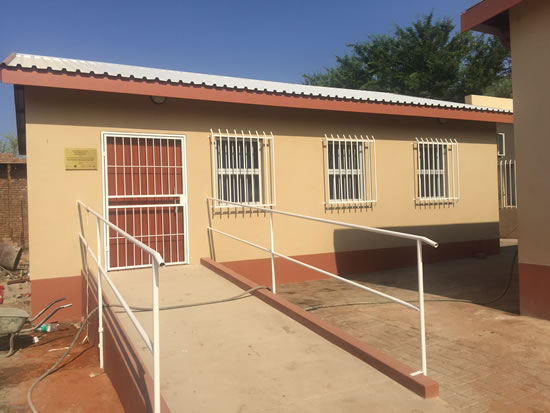 The Oasis Skills Development Centre is situated in the ZF Mgcawu municipality in Upington in the Northern Cape. About 16 000 people living with disability reside in the area. This is the highest prevalence of disabilities in the country.
The Oasis Skills Development Centre is situated in the ZF Mgcawu municipality in Upington in the Northern Cape. About 16 000 people living with disability reside in the area. This is the highest prevalence of disabilities in the country.
The centre has assistive equipment, and an early childhood development facility with a stimulation room for children with disabilities. It also has a computer laboratory for improving children’s computer skills. The computer laboratory has 22 computers, a server for Internet access, and a printer.
Speaking at the launch of the centre, Minister of Social Development Bathabile Dlamini, called for national, provincial, and local spheres of government to work together with government entities and prioritise the rights of persons with disabilities.
“This centre affords people with disabilities and youth who dropped out of school an opportunity to make a living through their own hands. People with disabilities are also learning artwork and produce furniture, garden chairs and tables.”
In support of the Social Development Food Nutrition Programme, learners from within the centre have created a food garden, which contributes to providing nutritious meals to help reduce malnutrition.
According to the DSD, the area of Upington shows high levels of alcohol abuse even among pregnant women. This causes Foetal Alcohol Syndrome which affects newborn babies.
The DSD has established 15 skills development centres to improve the living conditions of persons with disabilities.
The White Paper for people with disabilities
The centre will also work to embrace and uphold the rights of persons with disabilities, which will help government realise the objectives of the White Paper for People with Disabilities.
The White Paper on the rights of persons with disabilities advocates for measures that will hold duty-bearers accountable and strengthen recourse measures for persons living with disabilities whose rights have been violated.
Minister Dlamini said the aim of the White Paper for People with Disabilities is to make provision for the removal of discriminatory barriers through universal access by ensuring that persons with disabilities are not segregated from mainstream societal activities.
“It further calls for provision of barrier-free, appropriate, effective, efficient and coordinated service delivery to persons with disabilities.”
Bursary helps youngster build her dreams
Bursary helps youngster build her dreams Estelle GreeffTo address the need for scarce skills, the KwaZulu-Natal (KZN) Department of Public Works awards bursaries to help young people further their studies and realise their dreams.
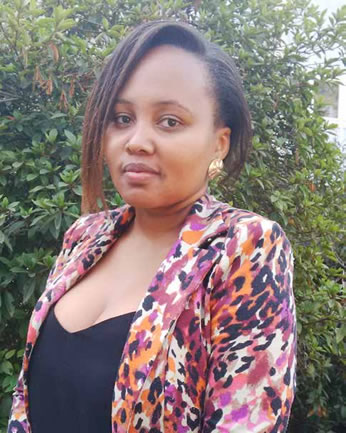 Young female architect Nandipha Makhanye (26) from Sobantu in Pietermaritzburg, who recently graduated from the University of KwaZulu-Natal, is a product of the Department of Public Works' Bursary and Internship Programme. She now works for KZN Public Works. Her main duties include the design of building plans for the department. Before constructing a building, an architect needs to drwa a plan of the building. Sometimes architects will make a cardboard or plastic model of the building. "The bulding is then builtt by a construction company which follows the directions of the plans of the building," said Makhanye.
Young female architect Nandipha Makhanye (26) from Sobantu in Pietermaritzburg, who recently graduated from the University of KwaZulu-Natal, is a product of the Department of Public Works' Bursary and Internship Programme. She now works for KZN Public Works. Her main duties include the design of building plans for the department. Before constructing a building, an architect needs to drwa a plan of the building. Sometimes architects will make a cardboard or plastic model of the building. "The bulding is then builtt by a construction company which follows the directions of the plans of the building," said Makhanye.
The KZN Department of Public Works' Bursary and Internship Programme gives deserving students an opportunity to study Architecture, Engineering (mechanical, electrical, civil and structural), Property Management and Construction Management as well as Quantity Surveying.
Makhanye told Vuk’uzenzele that even though she had academic colours in high school she didn’t get a bursary for her first year.
“My mother funded my studies for the first two-and-a-half years and with the realisation that my sister was soon to join me in tertiary education, it became clear that my mother would need some sort of financial support. There were just two students that I knew who were on the bursary from the Department of Public Works. Everyone else seemed to be financially stable or at least comfortable with paying the tuition fees,” said Makhanye.
She did research about the bursary and eventually applied.
“I was told that it wasn't the correct time to apply but because I was desperate, I applied anyway. My clean academic record made it easy for me to be accepted. It assured the department that I was determined to succeed and awarding me with the bursary would not be a waste. Both my mother and I felt lucky I had been awarded the bursary,” she said.
She studied for five years (three years for a Bachelor of Architectural Studies degree and two years for a Master’s) while working for various architectural firms.
“It hasn’t been smooth sailing entering a male-dominated field. There have been plenty of challenges, not for just being a woman, but for being a young black woman. Being on site has been the most challenging, especially when I have to give instructions to men who are much older than me. But I do not allow the daily challenges to bring me down as I constantly remind myself that I am doing architecture because I am passionate about it and it is something I love, therefore small challenges will only make me stronger,” she said.
Makhanye said she is grateful to the KZN Department of Public Works for giving her the opportunity to realise her dreams.
“I doubt I would have had the
financial muscle to continue with my studies. The internship and bursary both helped me escape years of debt that I would have accumulated trying to do what I love and for that I will always be eternally grateful to the department,” she said.
Makhanye’s advice to the youth is to work hard and follow your passion. “Nothing comes easy. You need to be prepared to work for it,” she said.
Jobs: Capricorn District Municipality
Jobs: Capricorn District Municipality andileDepartment: Community Services
Position: Operations Manager – Municipal Health Services
Level: 4 Salary Scale: R378 015.90 – R 417 294.60 (Excluding benefits)
Requirements: A National Diploma or B. Tech in Public Health or Equivalent qualification coupled with a minimum of five (05) years' experience as Chief Environmental Health Practitioner or related work. Must have a valid driver's licence. Knowledge of computer Microsoft packages would be an added advantage.
Knowledge; Skills and Personal Attributes: Knowledge of legislative frameworks governing Municipal Health Services; Good communication, report writing and analytical skills.
Key Performance Areas: Manage and coordinate the food quality monitoring and sampling programs, water sampling programs; evaluate waste sites and projects programs; Manage and monitor notifiable cases; Define, implement and monitor the objectives for the Municipal Health function in line with the SDBIP; Produce employee related reports to Management as and when required; Participate in formulation and implementation of procedures, systems and
controls; Manage staff within the sub-unit, Prepare monthly report.
Department: Community Services
Position: Chief Environmental Health Practitioner (X2)
Level: 06
Salary Scale: R300 422.16- R331 728.07 (Excluding Benefits)
Minimum Requirements: National Diploma in Environmental or B Tech/Degree in Environmental Health or relevant equivalent qualification. Must be currently registered with the Health Professions Council of South Africa. Four (04) years working experience in Environmental Health. Computer literacy and a valid driver's license.
Knowledge; Skills and Personal Attributes: Ability to work under pressure, Report writing, Communication and Interpersonal skills.
Key performance areas: Supervises and coordinates inspections and investigations of Environmental Health projects; Carry out follow-up inspections to ensure compliance; Seek approval and serve compliance orders and notifications to stop or correct specific sequence to enable compliance; Manage performance of personnel in the Section.
Department: Community Services
Position: Disaster Management Coordinator Level: 07 Salary Scale: R252 652.03 – R278 926. 01 (Excluding Benefits)
Requirements: National Diploma in Disaster Management or Equivalent NQF Level 07, Valid Code 10 driver's licence. At least two (2) years' experience working in a related field.
Knowledge, Skills And Personal Attributes: Knowledge and understanding of the all legislation and policies applicable to the field of Disaster Management and the ability to interpret and apply same; Must be able to make input on the development and review of policies. The incumbent must be physically fit as he/she may be required to work
odd hours under very strenuous conditions especially after disaster situations.
Responsibilities: Conduct risk assessment, planning and establish a uniform approach to assess and monitoring disaster risks that will inform disaster management planning and risk reduction undertaken by organs of state and other role players. Ensure that risk reduction programs are in accordance with the applicable framework. Conduct and promote stakeholder awareness, training and education; Administer and coordinate Disaster Management Services activities; Conduct the local and district forum and provide support to sector departments.
Department: Infrastructure Services
Position: Laboratory Assistant (Chemistry)
Level: 8 Salary Scale: R 223 100.15 747.57 – R 246 426.57 (Excluding benefits)
Requirements: B.Sc. in Chemistry, Biochemistry or Applied Science, National Diploma in Analytical Chemistry or Water Care, B.Sc. (Community Water Services and Sanitation). NIII(N3) in Laboratory Assistance. Minimum of six (06) months experience working in a private or public laboratory providing semi-technical support to professional laboratory staff.
Knowledge; Skills and Personal Attributes: Ability to apply principles, techniques to understand terminology used in the water testing laboratory, Be able to add, subtract, multiply and divide in all units of measures using whole numbers, common fractions and decimals.
Key Performance Areas: Provide support to laboratory professionals and analysts to ensure that the water quality testing laboratory maintains its accreditation status in accordance with South African National Accreditation System requirements for compliance in terms of testing all drinking water and wastewater samples by performing variety
of tasks in accordance with the South African National Standards (SANS 241) and Wastewater Effluent Quality Standards.
Department: Infrastructure Services
Position: Borehole Operator (X30)
Level: 13 Salary Scale: R111 829.59 – R124 178.86 (Excluding Benefits)
Villages where positions exists: Aganang LM : (Turlburg, Rozenkrans, Prospect, Burgwal, Cooperspark, Mankgodi, Leokaneng , Boslaagte, Mamehlabe, Pinkie-Sebotse , Mohlajeng, Ga-Kolopo). Blouberg LM : (Cracouw, Mokumuru, Silvermyn, De Villians 2 and 03, Swarts, Sadu, Dilaeneng, Borkum, Maokeng, Indermaak B, Simpson, Juniorsloop, Letswatla (Visovious), Letswatla) Lepelle-Nkumpi LM : (Madisha Ditoro, Motserereng, Mathibela, Mashite, Ntotokwane, Lesetji, Rakgwele, Motsane, Bublin Molemole : (Dikgading, Pota, Mphakana, Mohodi Mankwe Paka)
Requirements: Grade 10 or 5 years' experience as a Borehole Operator, Grade 12 and a valid driver's license will be an added advantage.
Knowledge; Skills and Personal Attributes: Knowledge of the operations of water sector and / or local government sector, operation of boreholes; good listening and communication skills, ability to follow instructions and work with a team.
Responsibilities: Control values for reticulation; inspect pipe line reticulation e.g. leaks and burst pipes; Transportation of an engine to the borehole; Inspection of the pump house, borehole , and daily check-ups of a diesel engine and run the engine , Reservoir levels monitoring with the inflow and outflow check ; inspection of the pump house, borehole and daily check-ups of an electrical motor and run the engine .
Department: Infrastructure Services
Position: General Worker (X4) (Lepelle Nkumpi X2, Blouberg X2)
Level: 14 Salary Scale: R 94 513.63 – R116 055.01 (Excluding Benefits)
Requirements: Minimum qualification of Grade 10/Standard 8.
Knowledge, Skills and Personal Attributes: Knowledge of water sector or local government sector; good listening and communication skills, must be able to follow instructions and work with them a team, be able to operate under extreme hot weather.
Responsibilities: Undertakes general labouring tasks associated with providing support during installation, repair and maintenance of water reticulation systems by using hand held tools to excavate defined areas, laying of pipes and lines, cleaning or clearing of overgrown vegetation interfering with water and waste water systems.
Department: Financial Management Services
Position: Senior Accountant – Expenditure
Level: 04 Salary Scale: R404 477 01.90 – R446 505.55 (Excluding Benefits)
Requirements: B Com. Honours Degree in Accounting; Five (5) years' experience in a financial department of which (two) 2 years' should have been acquired in middle management.
Knowledge; Skills and Personal Attributes: Knowledge of the Municipal Finance Management Act, financial principles and related legislations.
Key Performance Areas: Manage the creditors' sub-section by ensuring that the payments source documents are correct, reconcile the suspense and control accounts for accuracy and to prepare the electronic fund transfer before release. Manage the payroll sub-section by overseeing the reconciliation of payroll on a monthly basis and review payroll journals. Assess performance of subordinates in the creditors and payroll sub-sections. Perform any other duties assigned by the supervisor.
Department: Financial Management Services
Position: Accountant – Payroll
Level: 5 Salary Scale: R348 651.16 - R384 911.28 (Excluding Benefits)
Requirements: B Com: Accounting; Minimum of two (02) years' experience in the payroll, experience in SAP, and VIP will be an added advantage.
Knowledge; Skills and Personal Attributes: Knowledge of legislative frameworks governing Local Government; Municipal Finance Management Act, Financial principles and related legislations; Good communication and report writing skills.
Key Performance Areas: Reconciliation between payroll systems and GL Accounts; Processing of all salary transactions; Calculations and processing of third party payments such as SARS, medical aid and pension funds.
Department: Financial Management Services
Position: Admin Clerk- Finance Services
Level: 8 Salary Scale: R 223 100.15 747.57 – R 246 426.57 (Excluding Benefits)
Requirements: Grade 12 or Equivalent; Minimum of 3 years' experience in records management environment. National Diploma in Finance or Accounting will be an added advantage.
Knowledge; Skills and Personal Attributes: Knowledge of legislative frameworks governing Local Government; Municipal Finance Management Act; financial principles and related legislations; Good communication skills.
Key Performance Areas: Provide administrative support to the Financial Management Department by keeping records of all outgoing documents, keeping manual and electronic filing system of documents to ensure proper administration and easy retrieval of such documentation whenever required.
Department: Financial Management Services
Position: Meter Reading Supervisor
Level: 8 Salary Scale: R 223 100.15 747.57 – R 246 426.57 (Excluding Benefits)
Requirements: Relevant NQF 5 or equivalent qualification in Public Administration; Minimum of 3 years' experience in the reading environment, Valid driver's licence.
Knowledge; Skills and Personal Attributes: Knowledge of legislative frameworks governing Local Government; Municipal Finance Management Act; financial principles and related legislations; Good communication and report writing skills.
Key Performance Areas: To effectively plan, coordinate, control, and manage Meter Reading; Validate readings for billing; Process water disconnection and reconnection activities for credit control purposes.
Department: Financial Management Services
Position: Financial Management Grant (Fmg) Internship Programme X3 (Three Years Contract) Total Package: R 100 000.00 (Total Package)
Requirements: B.Com Degree or three (03) year National Diploma in Accounting and unemployed; the candidate should not have participated in an internship of a similar nature before.
Knowledge; Skills and Personal Attributes: Must be eager to learn, be self-motivated with a passion for Accounting.
Key Performance Areas: The appointed intern will work in the following areas over the period: Budget and Treasury, Supply Chain Management, Expenditure and Income units.
Department: Corporate Services
Position: It Technician
Level: 6 Salary Scale: R 300 422.90 – R 331 728.07 (Excluding Benefits)
Requirements: Degree/ Diploma /A+,N+ and NQF Level 5 in ICT and minimum of four (04) years' experience in a related position.
Knowledge; Skills and Personal Attributes: Knowledge and understanding of the IT related policies, procedures and standards and the ability to interpret and apply same; Must have excellent communication skills, report writing, interpersonal skills and the ability to conduct training.
Key Performance Areas: Install, configure and maintains software and hardware applications including peripherals for the purpose of ensuring ongoing operations of computers across multiple sites; Maintain inventory and services or repair vendor call records of supplies equipment, software and furnishings for the purposes of ensuring availability of items and
proper working order. Implement regular housekeeping by updating the asset register daily and attending to logged queries; Communicate and interpret IT procedure to users and ensure compliance thereto and provide basic training on computer training. Provide day to day IT support to users.
Department: Corporate Services
Position: Human Resources Records Clerk
Level: 08 Salary Scale: R 223 100.15 747.57 – R 246 426.57 (Excluding Benefits)
Requirements: A Bachelor degree in Administration / National Diploma in Archives/ Records Management; Minimum of two (02) years' experience in Human Resources Records Management; Computer literacy will be an added advantage.
Knowledge; Skills and Personal Attributes: Honesty and integrity; Customer service orientation; Quality orientation and work standards; Ability to work under pressure; Pay attention to details as well as planning and organising.
Key Performance Areas: Maintain physical and electronic records, Execute filing administration of termination records, File and retrieve recruitment records, personnel records as well as leave records. Ensure that the Municipality complies with the administrative prescripts of Human Resources records and archiving policy together with the legal provisions of applicable policies and systems; Ensures that access to records are strictly controlled in compliance with the National Archives Act of South Africa;
Department: Corporate Services
Position: General Assistant X3 (Polokwane, Ga-Mathapo And Turfloop)
Level: 14 Salary Scale: R 94 830.54 – R 111 829.59 (Excluding Benefits)
Requirements: Grade 10 or equivalent; Must be able to read and write; Knowledge of building maintenance will be an added advantage; Minimum of one (01) year working experience in cleaning and/or maintenance environment.
Knowledge, Skills and Personal Attributes: Good listening and communication skills; ability to follow instructions and work well independently as well as in teams;
Responsibilities: Cleaning of office building, rest rooms and surrounding areas to ensure neatness at all times; Eradicate weeds and unwanted plants and attend to adhoc maintenance activities in offices.
Department: Strategic Executive Management Services
Position: Disability And Elderly Coordinator
Level: 06 Salary Scale: R300 422.16- R331 728.07 (Excluding Benefits)
Requirements: Bachelor's Degree / National Diploma in Social Science / Development Studies or equivalent NQF 5; Two (02) years working experience in a relate field or community development, computer literacy, valid driver's license.
Knowledge; Skills and Personal Attributes: Strong interpersonal skills that enables interaction and maintenance of relationships with a wide range of stakeholders; Ability to work with people across all sectors; People and diversity management, Recognise the value of self-development; Pay attention to detail.
Responsibilities: Support the Operations Manager Special Programmes in terms of design, delivery and coordination of developmental programmes for people living with disability and the elderly; Guide the integration of the elderly and people living with disability in all developmental programmes and operations in the municipality; Coordinate awareness raising programmes, calendar days events and socio – economic empowerment programmes; Liaise and collaborate with other stakeholders in conceptualising, implementing and monitoring development programmes for the elderly and people living with disabilities in the district, Establish links with Civil Society Organisations, Government departments and other relevant
stakeholders relevant to the enhancement of these special programmes in the district; Coordinate mainstreaming of youth programmes in the IDP, Assist in monitoring and evaluation of the development of policies and programmes to advance internal transformation.
Interested candidates should forward an application letter indicating the position they are applying for, comprehensive CV, certified copies of qualifications and ID to the Municipal Manager, Capricorn District Municipality, P O Box 4100, Polokwane, 0700 or hand – deliver applications at 41 Biccard Street, Polokwane at the registry desk. Faxed and e – mailed applications will not be considered. Enquiries should be directed to Prudence Sieda at (015) 294 1230 or Priscilla Shilubane at (015) 294 1087.
Capricorn District Municipality is committed to the achievement and maintenance of diversity and employment equity, especially in terms of race, gender and disability. Applicants from these designated groups are encouraged to apply. CDM reserves the right to make appointments. If you do not hear from us 3 months after the closing date, kindly accept that your application was unsuccessful. Closing Date: 29 April 2016
Jobs: Justice and Constitutional Development Apr 2016
Jobs: Justice and Constitutional Development Apr 2016 andileDIRECTOR: COURT OPERATIONS
REFERENCE: 49/16/WC
PACKAGE: R864 177 – R1 017 972 per annum (All inclusive). The successful candidate will be required to sign a performance agreement
REQUIREMENTS: An undergraduate qualification (NQF Level 7) as recognized by SAQA; At least 6 – 10 years’ experience of which five (5) years must be at middle/ senior managerial level; Experience in Court management will be an added advantage; Knowledge and understanding of the work of the Departments within the JCPS; Knowledge of legislation, prescripts and Frameworks of the Public Service; A valid driver’s licence.
ENQUIRIES: Adv H Mohamed Tel. (021) 466 8247
FAMILY ADVOCATE LP 8
REFERENCE: 50/16/FA/WC
PACKAGE: R751 356 – R1 058 196 per annum. (Salary will be in accordance with OSD determination). (The successful candidate will be required to sign a performance agreement)
REQUIREMENTS: An LLB Degree or recognized four (4) year legal qualification; At least eight (8) years appropriate post qualification/litigation experience; Admitted as an Advocate or an Attorney with right of appearance in the High Court; A valid driver’s licence.
ENQUIRIES: Advocate Britz (023) 3471238
DEPUTY DIRECTOR: BUDGETING AND INTERNAL CONTROL
REFERENCE: 16/77/KZN
PACKAGE: R612 822 – R721 878 per annum (All inclusive). The successful candidate will be required to sign a performance agreement.
REQUIREMENTS: An appropriate three-year financial /commercial /management degree or equivalent qualification; Six (6) years working experience in a Financial Management environment with at least five (5) years experience on management level; A valid driver’s licence. The following will serve as recommendation: Knowledge of the Public Finance Management Act and its Treasury Regulations.
ENQUIRIES: Mr J.N. Mdaka ( (031) 372 3000
DEPUTY DIRECTOR: ADMINISTRATION
REFERENCE: 16/45/FS
CENTRE: REGIONAL OFFICE, BLOEMFONTEIN
PACKAGE: R612 822 – R721 878 per annum (All inclusive). The successful candidate will be required to sign a performance agreement.
REQUIREMENTS: A Degree or 3 years National Diploma in Public Management/ Administration or relevant equivalent; Five (5) years managerial or supervisory experience. Knowledge and experience in facilities management, Auxiliary services including IT, Fleet Management, Registry, Library and Switchboard and Cleaning services. Knowledge of Court Management and Court Administration projects will be an added advantage; A valid driver’s licence.
ENQUIRIES: N.N Sithole at (051) 407 1800.
SENIOR ASSISTANT STATE ATTORNEY (LP5 - LP6)
REFERENCE: 16/86/SA
SALARY: R422 586 – R997 008 per annum. (Salary will be in accordance with OSD determination). The successful candidate will be required to sign a performance agreement.
REQUIREMENTS: An LLB or 4 years recognized legal qualification; Admission as an Attorney; The right of appearance in the High Court of South Africa; At least 4 years appropriate post qualification legal/litigation experience; A valid driver’s licence.
ENQUIRIES: Ms. K. Ngomani ( (012) 357 8661
FAMILY COUNSELLOR SUPERVISOR (GRADE 1)
REFERENCE: 51/16/FA/WC
SALARY: R318 102 – R368 766 per annum. (Salary will be in accordance with OSD determination). (The successful candidate will be required to sign a performance agreement)
REQUIREMENTS: Bachelor Degree in Social Work or equivalent qualification which allows for professional registration with the SACSSP; A minimum of five (5) years appropriate experience of supervisory practice; Knowledge and experience in Mediation and the principles and practices of Social work profession ; Court experience in Evidence; Knowledge and application of Family Law, including leading Mediation in certain Divorce Matters Act, Maintenance Act and Domestic Violence Act; Children’s Act (inclusive Hague Convention on International Child Abduction); A valid drivers’ licence.
ENQUIRIES: Adv G Parker Tel: (021) 426 1216
COURT MANAGER:
REFERENCE: 57/16/WC
SALARY: R389 145 – 458 385 per annum. (The successful candidate will be required to sign a performance agreement)
REQUIREMENTS: A three (3) year Bachelor’s Degree in Administration/ National Diploma Service Management (NQF Level 5) plus the module on Case Flow Management or relevant and equivalent tertiary qualification; At least 3 years’ managerial or supervisory experience; A valid driver’s licence. The following serve as a strong recommendation: Knowledge and experience in office and district administration; Knowledge of the financial management and PFMA; Experience in managing Trust (Third Party Funds) and Vote Account; Experience in the Court environment will be an added advantage.
ENQUIRIES: Mr D Xegwana Tel: (021) 572 1003
SENIOR LEGAL ADMINISTRATION OFFICER: (MR- 6)
REFERENCE: 54/16/WC
SALARY: R364 566 – R886 107 per annum. (Salary will be in accordance with OSD determination). The successful candidate will be required to sign a performance agreement
REQUIREMENTS: LLB Degree or four (4) years recognized qualification; At least eight (8) years appropriate post – qualification legal experience; Thorough knowledge of South African Legal System, legal practice and related spheres, with specific reference to civil litigation; Working knowledge of criminal procedure and practices, court rules (Constitutional Court, Supreme Court of Appeal, High Courts, Labour Courts and Magistrate Courts); A valid driver’s licence.
ENQUIRIES: Mr N Luddy ( (021) 462 5471.
ASSISTANT DIRECTOR: LABOUR RELATIONS
REFERENCE: 16/73/KZN
SALARY: R311 784 – R367 254 per annum. The successful candidate will be required to sign a performance agreement.
REQUIREMENTS: A three (3) year National Diploma/Degree in Labour Law/ Labour Relations or relevant equivalent qualification; At least 3 years’ relevant experience in supervisory/junior management position in the Labour Relations environment; a valid driver’s licence.
ENQUIRIES: Mr J.N. Mdaka ( (031) 372 3000
ASSISTANT DIRECTOR: THIRD PARTY FUNDS
REFERENCE: 16/74/KZN
SALARY: R311 784 – R367 254 per annum. The successful candidate will be required to sign a performance agreement.
REQUIREMENTS: A Degree/National Diploma in Financial Management or equivalent qualification; A minimum of three (3) years relevant experience in a financial accounting/management environment, of which one (1) year must be at a junior/middle management level; Knowledge of Public Finance Management Act (PFMA), National Treasury regulations; Knowledge and experience of the Department of Justice and Constitutional Development and it’s Third Party Fund functions and services; Experience on the Justice Deposit Account System (JDAS), Justice Management Information Systems (JMIS); Knowledge of GRAP/GAAP, accrual accounting as well as modified cash and cash accounting; A valid driver’s license. The following will serve as recommendations: Knowledge of the Departmental Financial Instructions (DFI).
ENQUIRIES: Mr J.N. Mdaka ( (031) 372 3000
ASSISTANT DIRECTOR: RECRUITMENT, APPOINTMENTS AND MOBILITY (2 POSTS)
REFERENCE: 16/71/KZN
SALARY: R311 784 – R367 254 per annum. The successful candidate will be required to sign a performance agreement.
REQUIREMENTS: A three (3) year National Diploma/Degree in Human Resource Management or relevant field; Six( 6) years’ experience in Human Resources and three (3) years supervisory experience; Driver’s licence.
ENQUIRIES: Mr J.N. Mdaka ( (031) 372 3000
ASSISTANT DIRECTOR: HRD AND EE
REFERENCE: 16/72/KZN
SALARY: R311 784 – R367 254 per annum. The successful candidate will be required to sign a performance agreement.
REQUIREMENTS: Three (3) year National Diploma/Degree in Human Resource Management/Industrial Psychology or relevant field; Six( 6) years’ experience in Human Resource environment and a minimum of three (3) years supervisory experience within training and development environment; A valid driver’s licence
ENQUIRIES: Mr J.N. Mdaka ( (031) 372 3000
ASSISTANT DIRECTOR: PERFORMANCE MANAGEMENT
REFERENCE: 16/70/KZN
SALARY: R311 784 – R367 254 per annum. The successful candidate will be required to sign a performance agreement.
REQUIREMENTS: A three (3) year National Diploma/Degree in Human Resource Management or relevant equivalent qualification; Six 6 years’ experience in Human Resource environment; Three years supervisory experience as generalist or within the service conditions environment; a valid driver’s licence.
ENQUIRIES: Mr J.N. Mdaka ( (031) 372 3000
CLUSTER MANAGER: COURT INTERPRETING (3 POSTS)
REFERENCE: 2016/80/GP; CENTRE: GERMISTON CLUSTER
REFERENCE: 37/16/LMP. CENTRES: POLOKWANE CLUSTER AND THABAMOOPO CLUSTER
SALARY: R311 784 – R367 254 per annum. The successful candidate will be required to sign a performance agreement.
REQUIREMENTS: NQF level 4/Grade 12 and National Diploma in Legal Interpreting at NQF level 5 or any other relevant tertiary qualification at NQF level 5, Proficiency in English and two or more indigenous languages; Six (6) years practical experience as a Court interpreter with minimum three years supervisory experience as a supervisory experience; A valid driver’s licence.
ENQUIRIES: GAUTENG: Mr T Modise ( (011) 332 9000
ENQUIRIES: LIMPOPO: Mr Makhobotloane PNP. ( 015 287 2081.
Mr Masemola TD. ( 015 287 2025.
ASSISTANT STATE ATTORNEY, (LP3-LP4)
REFERENCE: 16/78/SA
SALARY: R247 236 – R707 925. (Salary will be in accordance with OSD determination). The successful candidate will be required to sign a performance agreement.
REQUIREMENTS: An LLB or 4 year recognized legal qualification; Admission as an Attorney; At least 2 years appropriate post legal/litigation experience; Right of appearance in the High Court of South Africa; A valid driver’s licence; Admission as Conveyance will be an added advantage.
ENQUIRIES: Mr E. Seerane ( (012) 357 8661
SOCIAL WORKER\ FAMILY COUNSELLOR GRADE 1-4
REFERENCE: 16/VA35/NW
SALARY: R211 263 – R481 155 per annum. (Salary will be in accordance with the OSD determination). The successful candidate will be required to sign a performance agreement.
REQUIREMENTS: Bachelors Degree on Social work or equivalent qualification; A minimum of 3 years appropriate experience in Social work after registration as Social worker with the SACSSP; Registration with SA Council for Social Service Professions (SACSSP); Knowledge and experience in Mediation; Knowledge and application of Family Law, including Mediation in Certain Divorce Matters Act, Maintenance Act and Domestic Violence Act. (Inclusive of Hague Convention on International Child Abduction); A valid drivers licence.
ENQUIRIES: Mr. Bheki Sibiya ( (018) 397 7061.
MAINTENANCE OFFICERS (MR-1 – MR-5) (CONTRACT POST ENDING 31 MARCH 2017)
REFERENCE: 013/16/NC
SALARY: R162 726 – R762 630 per annum. (Salary will be in accordance with OSD determination). The successful candidate will be required to sign a performance agreement.
REQUIREMENTS: An appropriate four year recognized legal qualification (Proc or LLB); Extensive knowledge of the maintenance system; Proficiency in at least two official languages; Understanding of all services and procedures in the area of maintenance and other areas of family law; A valid driver’s licence.
ENQUIRIES: Mr. J. Tope ( (053) 802 13000
MAINTENANCE OFFICER (MR-1 – MR-5)
REFERENCE: 009/16/NC
SALARY: R162 726 – R762 630 per annum. (Salary will be determined in accordance with the experience as outlined in terms of the Occupational Specific Dispensation for legally qualified personnel) The successful candidate will be required to sign a performance agreement.
REQUIREMENTS: An appropriate four year recognized legal qualification (Proc or LLB); Extensive knowledge of the maintenance system; Proficiency in at least two official languages; Understanding of all services and procedures in the area of maintenance and other areas of family law; A valid code driver’s licence;
ENQUIRIES: Mr. J. Tope ( (053) 802 13000
MAINTENANCE OFFICER (MR1 – MR4)
REFERENCE: 16/75/KZN
SALARY: R162 726 – R291 249 per annum. (Salary will be in accordance with OSD determination). The successful candidate will be required to sign a performance agreement.
REQUIREMENTS: LLB Degree or four year recognised legal qualification; Extensive knowledge of the maintenance system; and family law matters; A valid driver’s license; Computer literacy (experience in MS Office); Certificate reflecting these courses to be attached; Knowledge of the Maintenance Act (Act 99 of 1998).
ENQUIRIES: Mr J.N. Mdaka ( (031) 372 3000
Closing Date is 03 May 2016
NOTE: Interested applicants may visit the following website: www.justice.gov.za or www.dpsa.gov.za to view the full job specification of the above positions. Applications must be submitted on Form Z83, obtainable from any Public Service Department or on the internet at www.gov.za. A Z83 form & CV must be accompanied by original certified copies of qualifications and identity document and a driver’s licence where necessary. A SAQA evaluation report must accompany foreign qualifications. Applications that do not comply with the above mentioned requirements will not be considered. All shortlisted candidates for SMS posts will be subjected to a technical exercise that intends to test relevant technical elements of the job, the logistics of which will be communicated. Following the interview and technical exercise, the selection panel will recommend candidates to attend a generic managerial competency assessment (in compliance with the DPSA Directive on the implementation of competency based assessments). Candidate will complete a financial disclosure form and also be required to undergo a security clearance. If the candidate is applying for an OSD post, certificates of service must be attached to the CV.
The DOJ&CD is an equal opportunity employer. In the filling of vacant posts the objectives of section 195 (1) (i) of the Constitution of South Africa, 1996 (Act No: 108 of 1996), the Employment Equity imperatives as defined by the Employment Equity Act, 1998 (Act No: 55 of 1998) and relevant Human Resources policies of the Department will be taken into consideration. Reasonable accommodation shall be applied for People with Disabilities including where drivers licence is a requirement. Shortlisted candidates will be subjected to a personnel vetting process. Correspondence will be limited to short-listed candidates only. If you do not hear from us within 3 months of this advertisement, please accept that your application has been unsuccessful. The department reserves the right not to fill these positions. Women and people with disabilities are encouraged to apply and preference will be given to the EE Target.
Invitation to register as suppliers for waste management
Invitation to register as suppliers for waste management Estelle GreeffThe Department of Correctional Services Polokwane Area Commissioner invites specific suppliers to register as prospective suppliers on the database in order to comply with Treasury Regulation 16A; the Department implemented a supplier database to be used by procurement unit within the Department.
NB: Suppliers/Bidders already registered for this specific service, should re-register on the database for the financial year 2016/2017 and should meet the requirements below.
The following services is required:
- Waste Management
NB: Requirements from the potential waste management company:
1. The Healthcare waste management contracted shall provide documentation to show that the treatment and disposal procedures and facilities are:
- Licenced
- Have adequate capacity and that
- they comply with relevant national legislation and provisions.
2. The company should be licensed and permitted under:
- National Environmental Management: Waste Act, 2008 (Act 59 of 2008)
- Regulation 543 of 2010: Regulation under National Environment Management Act, 107 of 1998.
- The service provider should have a reputable experience in the management of healthcare waste (supply of containers, collection, treatment and disposal)
3. The Service provider shall produce documents containing the following information:
- Method of disposal to be used for each waste category
- Proof that the disposal facilities are adequate, licenced and comply with relevant legislation
- Proof of the final disposal of the healthcare waste collected previously.
All suppliers can register from the date of publication for a period of 30 days (CLOSING DATE 09 MAY 2016)
The registering points are as follows:
Polokwane correctional centre, cnr Landros & Hospital Street, Polokwane, 0700 Tel: 0152970409 Fax: 015 297 4540
Any enquiries about this matter could be communicated to: Mr BM Zulu or Ms L Mabusela at: 015 297 0409 ext. 218/219
Celebrating SA’s national symbols
Celebrating SA’s national symbols nthabiOne of the best ways that South Africans can celebrate 22 years of democracy and freedom is to understand the country’s national symbols.
Vuk’uzenzele has put together a guide to the national symbols that will help you understand your country better.
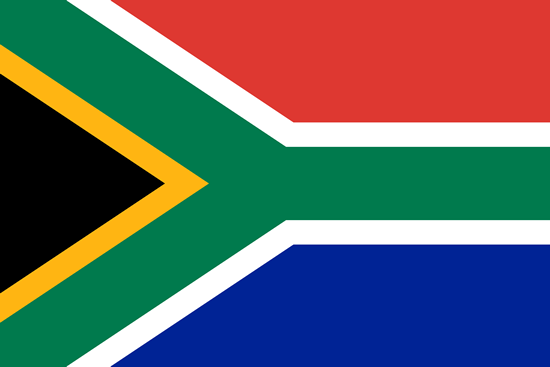 National flag
National flag
The national flag was designed by a former South African State Herald, Fred Brownell, and was first used on 27 April 1994. This is the same day that Nelson Mandela inaugurated as President. The design and colours are a synopsis of principal elements of the country's flag history. Individual colours, or colour combinations represent different meanings for different people and therefore no universal symbolism should be attached to any of the colours.
The central design of the flag, beginning at the flagpost in a 'V' form and flowing into a single horizontal band to the outer edge of the fly, can be interpreted as the convergence of diverse elements within South African society, taking the road ahead in unity. The theme of convergence and unity ties in with the motto Unity is Strength of the previous South African Coat of Arms.
National motto
The motto is: !ke e: /xarra //ke, written in the Khoisan language of the /Xam people, literally meaning diverse people unite. It addresses each individual effort to harness the unity between thought and action.
On a collective scale it calls for the nation to unite in a common sense of belonging and national pride - unity in diversity.
National animal
South Africa's national animal is the springbok, also giving its name to the South African rugby team, the Springboks or the "Boks".
The springbok (Antidorcas marsupialis) gets its common name from its characteristic jumping display - pronk in Afrikaans. The animal stands 75cm high and weighs about 40kg.
National flower
The giant or king protea (Protea cynaroides) is widely distributed in the south-western and southern areas of the Western Cape, from the Cedarberg up to just east of Grahamstown. South Africa's national flower is the largest of the proteas, which make up an important part of the Cape Floral Region, a major global biodiversity hotspot and a Unesco World Heritage site. The proteas also give their name to South Africa's national cricket team.
National tree
The yellowwood family of trees have grown in southern Africa for over 100 million years. The tree (Podocarpus latifolius) is South Africa's national tree, and can be found on Table Mountain, along the southern and eastern Cape coast, in the ravines of the Drakensberg up to the Soutpansberg and the Blouberg in Limpopo.
National bird
The national bird of South Africa is the blue crane (Anthropoides paradisia), which is almost entirely indigenous to the country.
Standing up to a metre tall, the crane is a light blue-grey, with a long neck supporting a rather bulbous head, long legs and elegant wing plumes which sweep to the ground.
National fish
South Africa's national fish is the galjoen (Dichistius capensis).
The galjoen is endemic to South Africa found only along the coastline from Namibia to Durban, and nowhere else in the world. The fish is also known for its fighting qualities, abundance and popularity.
National Coat of Arms
A national Coat of Arms, or state emblem, is the highest visual symbol of the State.
The Coat of Arms is also a central part of the Great Seal, traditionally considered to be the highest emblem of the State. Absolute authority is given to every document with an impression of the Great Seal on it, as this means that it has been approved by the President of South Africa.
Its central image is a secretary bird with uplifted wings, a sun rising above it. Below the bird is the protea, an indigenous South African flower, representing the aesthetic harmony of all cultures and the country flowering as a nation.
The ears of wheat are emblems of the fertility of the land, while the tusks of the African elephant symbolise wisdom, steadfastness and strength.
At the centre stands a shield signifying the protection of South Africans, above which are a spear and knobkierie. These assert the defence of peace rather than a posture of war.
Within the shield are images of the Khoisan people, the first inhabitants of the land. The figures are derived from images on the Linton Stone, a world-famous example of South African rock art.
Equal access education for all
Equal access education for all nthabiChildren with disabilities should have access to a decent education close to their homes by 2021.
Speaking during the 2016 National Disability Rights Summit, President Jacob Zuma said government was putting plans in place to ensure that children with disabilities were accommodated and supported in local schools.
President Zuma said children with disabilities should be able to attend schools close to their homes and receive the necessary support.
“Our goal, as government, is to ensure that by 2021, no children with disabilities will be out of school,” said President Zuma.
The summit was organised by the Department of Social Development to analyse and convert the White Paper on the Rights of Persons with Disabilities into realisable outcomes through practical implementation.
During the summit, delegates welcomed the approval by Cabinet of the White Paper on the Rights of Persons with Disabilities as a new era of activism in promoting, protecting and upholding the rights of all persons with disabilities in South Africa, and also called for legislation to be put in place to advance disability rights.
President Zuma said more than 6 850 students with disabilities have been enrolled at higher education institutions, and that over 2 800 have been enrolled at Technical and Vocational Education and Training Colleges in 2014.
The President also said more needs to be done to ensure that deaf South Africans are able to access information and communication.
Government introduced the South African Sign Language curriculum at school level from January 2015.
Deaf South Africans continue to experience high levels of marginalisation and exclusion due to a general lack of understanding, lack of South African Sign Language proficiency, and the availability of and expense associated with professional sign language interpreter services. This limits the social participation and integration of deaf persons.
Improving the lives of people with disabilities
One of the key issues the White Paper on the Rights of Persons with Disabilities aims to look into is strengthening disability equity evidence collection to ensure persons with disabilities have equal access to opportunities, lifelong learning, training and capacity building and all other services and interventions.
In this regard, the Department of Social Development has started a project to collect more data on disability in the country.
This includes tracking statistical disability trends including a disability monograph and development indicators; investigating whether persons with disabilities are considered and integrated into government programmes and policies; as well as the development of a Disability Inequality Index – a comparison between persons with disabilities and persons without disabilities.
The Department of Social Development is also working with Statistics South Africa to develop a Database on People with Disabilities.
The Department of Social Development stated that ultimately, government wants to be able to determine persons with disabilities’ enrolment and completion rates for early childhood development (ECD), general education and training, further education and training, higher education and training, and technical vocational education and training; their rate of employment in both the public and private sectors; as well as the political representation of persons with disabilities. Government aims for a five percent improvement in these indicators by 2019.
Government opens new community library in Petrusburg
Government opens new community library in Petrusburg nthabiSport, arts, culture
Arts and Culture Deputy Minister Rejoice Mabudafhasi recently opened a newly-built Bolokanang Community Library and launched the R120 million Mzansi Libraries Online in the Free State.
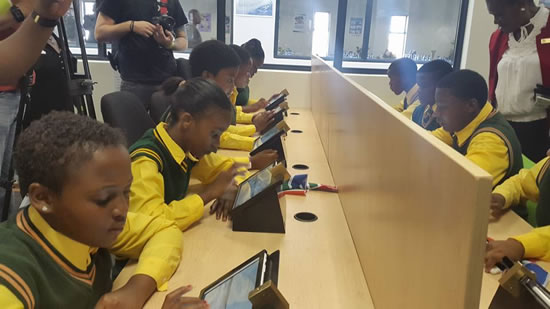 The opening of the new library and the launch of the Mzansi Libraries Online took place in Petrusburg.
The opening of the new library and the launch of the Mzansi Libraries Online took place in Petrusburg.
The Deputy Minister said libraries play an important role in developing communities.
“Libraries play a vital role in developing communities. As the Department of Arts and Culture, we are committed to build new public libraries, specifically in previously disadvantaged communities,” said the Deputy Minister.
The Bolokanang library was built at a cost of approximately R15 million and was developed as a dual purpose library that will offer services to the general community as well as to schools.
The project was funded from the Community Library Conditional Grant, which is made available by the Department of Arts and Culture to provincial departments to transform and upgrade public library services in the country.
“To date, through the Community Library Conditional Grant, we were able to build 81 new libraries, and 343 libraries have been upgraded which provide better facilities and services to their users. We are looking forward to build 23 more new libraries and upgrade 55 existing libraries in the 2016/17 financial year,” said Deputy Minister Mabudafhasi.
At the same ceremony, the Deputy Minister announced the start of the Mzansi Libraries Online project, funded by the Bill and Melinda Gates Foundation to strengthen and enhance public libraries in South Africa.
The project is set to upscale delivery by increasing access to technology free of charge and ensuring uninterrupted use of ICT equipment and internet services at 667 libraries/ communities across the country.
“Apart from traditional library services such as lending, reference and information services, each of the 667 libraries including Bolokanang will offer online public internet access to the community.
“An ICT infrastructure of 30 computers, tablets and educational computer games will form part of the ICT services. A Wi-Fi area is available for users wanting to use their own equipment such as smart phones, tablets and laptop computers,” she said.
A well-equipped educational toy library service will support early childhood development and provides access to educational toys, which are building blocks in the development of skills essential for learning to read, write and count.
Mzansi Libraries Online is a programme of the National Library of South Africa, in collaboration with the Department of Arts and Culture and the Provincial Library Services in all nine provinces.
KZN fashion designers given a boost
KZN fashion designers given a boost nthabiSport, arts, culture
Two hundred fashion designers have been given a lifeline by the KwaZulu-Natal Fashion Council (KZNFC).
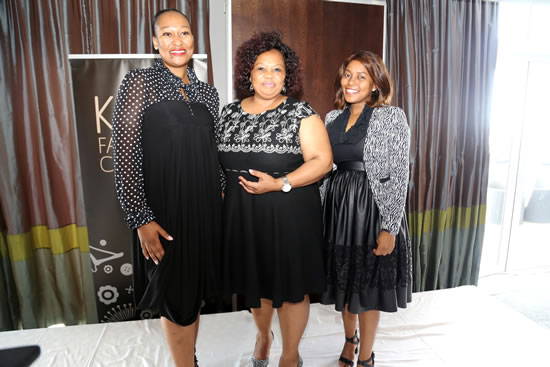 Fashion designers from the province, who are members of the KZNFC, now have access to training and skills development initiatives that will help to grow their businesses.
Fashion designers from the province, who are members of the KZNFC, now have access to training and skills development initiatives that will help to grow their businesses.
KZNFC, which was established in 2009 by the Ethekwini Municipality Economic Development and Investment Promotion Unit in partnership with the KwaZulu-Natal Department of Economic Development, Tourism and Environment Affairs, aims to provide assistance and guidance to local designers to equip them with skills that will enable them to provide for themselves and their families.
One of the beneficiaries Ayanda May, who had the privilege of travelling abroad to showcase her work, told Vuk’uzenzele that she joined the KZNFC when her business was not doing well.
“I started my company in November 2011 and didn’t really do well until I became a KZNFC member in 2012. That is when things started to happen. They made it possible for me to do a buyers’ lounge during the SA Fashion Week for 2012 and 2014. I represented South Africa at Messe and in Berlin. I also exhibited during Africa Fashion Week in London and I was chosen to take part in Ghana Fashion Week in 2015,” said May.
May now supplies over 10 boutiques nationally, including online shopping stores, and has been working with major clothing retailers. She currently employs three people and will soon increase this number to 10.
Another beneficiary Siyathemba Duma said she never thought that her business would be where it is today.
“I started my business in 2012 and didn’t know where to go in terms of marketing and advertising my business. But soon after I joined KZNFC the same year, things started to take shape. I thank the municipality for helping us,” she said.
Speaker of the Ethekwini Municipality, Logie Naidoo, said he is happy to listen to such success stories because it shows that the municipality is making strides in shaping the textiles industry and it’s starting to yield positive results.
“We believe this sector can play an active role in job creation and in growing the economy. From the 1980s to 1990s the textiles industry employed about 170 000 people in the province, but now sitting at just over 23 000 (according to KZN Textile Cluster figures).
“However, the employment statistics show a slight increase of 16 per cent between 2012 and 2015, which proves the worth of our efforts,” said Naidoo.
KZNFC Managing Director, Nomonde Masoka, said the council’s key highlights for 2014/2015 included the training of 255 designers, offering five bursaries of R5 000 to students at an accredited institute and establishing five designer district forums and municipal satellite offices.
“We will continue to provide support to the fashion industry this year, which includes the development of new markets for KZN exporters,” said Masoka.
KZNFC membership is free of charge.
For more information, fashion designers can visit www.kznfc.co.za or call 031 8258569/9647.
